May
2012/2 Download Roundup
Brian
Wilson
The May 2012/1 Roundup is here,
April 2012/2 here
and previous versions are indexed here.
Bargains
of the Month
Johann Sebastian BACH (1685-1750)
Cantatas 10-12
Cantata No.10, Meine Seel� erhebt den Herren (Visitation,
1724) [21:51]
Cantata No.11, Lobet Gott in seinen Reichen (Ascension,
1735) [29:00]
Cantata No.12, Weinen, klagen, sorgen, zagen (Easter
3, 1714) [23:53]
Concentus Musicus Wien/Nikolaus Harnoncourt (Nos.10 and 11)
Leonhardt Consort/Gustav Leonhardt (No.12)
WARNER TELDEC DAS ALTE WERK Vol.4 of 2564699437
[74:30] � from
amazon.co.uk (mp3)
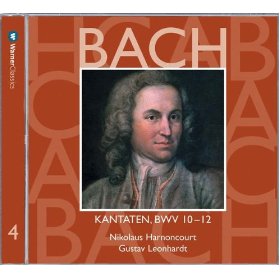 Despite
the undeniable strengths of modern cycles from John Eliot Gardiner
(Soli Deo Gloria and DG), Masaaki Suzuki (BIS � almost complete
on 50 volumes at the last count) and Sigiswald Kuijken (Accent
� under construction), there�s still much to be derived in the
way of instruction and entertainment from what remains of Karl
Richter�s DG Archiv cycle* and, above all, from the ground-breaking
Telefunken achievement, shared equally between Messrs Harnoncourt
and Leonhardt. Both employ boy trebles and counter-tenors �
the former no match for professional female singers, but what
Bach would have had in mind. If forced to choose between them
for my desert island, I�d go for Leonhardt, who contributes
a very fine No.12 to the present album.
Despite
the undeniable strengths of modern cycles from John Eliot Gardiner
(Soli Deo Gloria and DG), Masaaki Suzuki (BIS � almost complete
on 50 volumes at the last count) and Sigiswald Kuijken (Accent
� under construction), there�s still much to be derived in the
way of instruction and entertainment from what remains of Karl
Richter�s DG Archiv cycle* and, above all, from the ground-breaking
Telefunken achievement, shared equally between Messrs Harnoncourt
and Leonhardt. Both employ boy trebles and counter-tenors �
the former no match for professional female singers, but what
Bach would have had in mind. If forced to choose between them
for my desert island, I�d go for Leonhardt, who contributes
a very fine No.12 to the present album.
By contrast with more recent recordings, and even with the Ferrier/Jacques
version which I reviewed in the last Roundup, the opening chorus
of No.11 sounds a bit languid in Harnoncourt�s hands. The greater
discipline of Harnoncourt�s team, wins the day, but Karl Richter
beats both versions here with tempi to rival modern recordings:
use the link below to hear a sample.*
The practice of offering the cantatas in the Schmieder (BWV)
catalogue order throws together some strange bedfellows, in
this case separated by 20 years: No.10 is the German paraphrase
of the Magnificat � here Harnoncourt�s treble is severely
taxed but wins the day � No.11 is a joyful cantata, the so-called
�Ascension Oratorio�, while No.12 seeks to put away �weeping,
lamentation, worry and apprehension�.
This series is no longer available except as a 60-CD set, a
notable bargain to be sure, but many listeners won�t want the
whole bundle � perhaps preferring to mix and match different
performances � so the separate availability of individual discs
and some of the 6-CD sets as downloads from amazon.co.uk and
hmv.digital.com is an attractive proposition. (See below for
Volume 9.) In this case the amazon.co.uk download at £2.79
is the better bargain. The recording, at 256 kb/s, is good enough.
It�s not worth paying a little more at hmvdigital.com; their
offering of Nos.10-12 is also at 256kb/s. There are no texts,
but these and translations are easy to find online.
* Cantatas Nos.10 and 11 are part of the volume of music for
Ascension, Whitsun and Trinity � download only, in lossless
flac only, 439 3802 6CDs for £20.99 ($32.22), from deutschegrammophon.com.
Anton BRUCKNER (1824-1896) Symphony
No.8 in c minor (original version, ed. Haas)
Berlin Philharmonic Orchestra/Günter Wand � rec. live,
2001. DDD
BMG RCA RED SEAL 74321 82866-2 [87:07] � from hmvdigital.com
(mp3)
[�This is a towering achievement and I think it is likely to
be one of the most significant orchestral releases of 2002.
It is an essential purchase for all Brucknerians and for all
devotees of great orchestral playing and great conducting.�
See review
by John Quinn: Recording of the Month.]
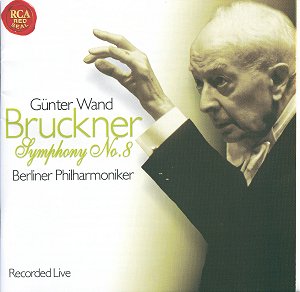 Unfeasible
as it may seem, this classic recording appears to be difficult
to obtain on CD. Stranger things have happened in the crazy
world of recorded music, but, surely, it must be scheduled for
reissue. Until then, only his earlier Cologne and NDR recordings
are available and, good as they are, this Indian Summer BPO
version outshines them, as John Quinn�s comprehensive review
makes clear. There�s no need to wait, however, for a CD reissue;
amazon.co.uk have a download at a ridiculously inexpensive £2.76,
presumably at 256kb/s, and hmvdigital.com offer superior 320kb/s
sound for just a touch more, at £3.16, and I recommend
paying that little extra.
Unfeasible
as it may seem, this classic recording appears to be difficult
to obtain on CD. Stranger things have happened in the crazy
world of recorded music, but, surely, it must be scheduled for
reissue. Until then, only his earlier Cologne and NDR recordings
are available and, good as they are, this Indian Summer BPO
version outshines them, as John Quinn�s comprehensive review
makes clear. There�s no need to wait, however, for a CD reissue;
amazon.co.uk have a download at a ridiculously inexpensive £2.76,
presumably at 256kb/s, and hmvdigital.com offer superior 320kb/s
sound for just a touch more, at £3.16, and I recommend
paying that little extra.
I�m not about to throw out my Eugen Jochum recording, also with
the BPO, currently available at a budget price in a package
of all the Bruckner symphonies on nine CDs, or mp3 or lossless
download from deutschegrammophon.com,
but if push came to shove it would have to be Wand.
If you haven�t yet discovered Günter Wand�s recording of
the Fourth Symphony, the �Romantic�, you�ll find my review in
the March 2010 Roundup
� another Bargain of the Month. As well as the
amazon.co.uk link there, hmvdigital.com
have that, too, in preferable 320kb/s form for £3.16.
The Hoffnung Astronautical Music Festival
Hoffnung Symphony Orchestra � rec. 1961. ADD/mono
PAST CLASSICS [42:06] � from emusic.com
(mp3)
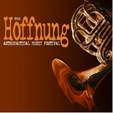 From
the sublime to the ridiculous in this 1961 posthumous tribute
to Gerard Hoffnung. The nonsense loses some of its point if
you can�t see it, and emusic.com don�t offer any notes to help
you understand what a glorious mish-mash of music is served
up here, as when Beethoven�s Leonora �No.4� metamorphoses into
�On top of a Load of Hay�, but it�s still funny � and ridiculously
inexpensive at £0.42. (Non-members will find it for £0.62
from amazon.co.uk.)
My own favourite is Humphrey Searle�s, alias �Bruno Heinz Jaja�s�
Barber of Darmstadt: Wer war die Dame mit der ich
dich gestern Abend gesehen habe? (Who was the lady I saw
you with last night?) in the manner of Luigi Nono and other
members of the Darmstadt School. The recording � variable bit-rate,
but up to 320kb/s in places � is decent enough to give pleasure.
From
the sublime to the ridiculous in this 1961 posthumous tribute
to Gerard Hoffnung. The nonsense loses some of its point if
you can�t see it, and emusic.com don�t offer any notes to help
you understand what a glorious mish-mash of music is served
up here, as when Beethoven�s Leonora �No.4� metamorphoses into
�On top of a Load of Hay�, but it�s still funny � and ridiculously
inexpensive at £0.42. (Non-members will find it for £0.62
from amazon.co.uk.)
My own favourite is Humphrey Searle�s, alias �Bruno Heinz Jaja�s�
Barber of Darmstadt: Wer war die Dame mit der ich
dich gestern Abend gesehen habe? (Who was the lady I saw
you with last night?) in the manner of Luigi Nono and other
members of the Darmstadt School. The recording � variable bit-rate,
but up to 320kb/s in places � is decent enough to give pleasure.
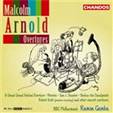 Follow
up with Malcolm Arnold�s riotous Grand Grand Festival Overture,
with solo parts for vacuum cleaners and a floor polisher, from
the 1956 Hoffnung Festival, on Chandos CHAN10293
from theclassicalshop.net.
It�s in the company of more �serious� Arnoldiana there, but
the whole thing is extremely enjoyable in some fine performances
the BBC Phil and Rumon Gamba. (See full details and review
by John Quinn: Recording of the Month. Please
refer also to MusicWeb International�s Hoffnung Collection here.)
Follow
up with Malcolm Arnold�s riotous Grand Grand Festival Overture,
with solo parts for vacuum cleaners and a floor polisher, from
the 1956 Hoffnung Festival, on Chandos CHAN10293
from theclassicalshop.net.
It�s in the company of more �serious� Arnoldiana there, but
the whole thing is extremely enjoyable in some fine performances
the BBC Phil and Rumon Gamba. (See full details and review
by John Quinn: Recording of the Month. Please
refer also to MusicWeb International�s Hoffnung Collection here.)
Second Thoughts
I was only partly convinced by the recent Linn recording of
Hector BERLIOZ Symphonie
Fantastique (CKD400). I�m not at all surprised, however,
that others have reacted much more positively, including Dan
Morgan, who features regularly in these download pages and who
recently made the SACD his recording of the Month � see review.
Collins
Classics
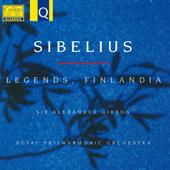 It�s
good to see so many recordings from the defunct Collins Classics
label resurfacing, not only as licensed to other labels but
also as downloads from classicsonline.com
(mp3) and eclassical.com
(mp3 and lossless) or for streaming from the Naxos Music
Library. Emusic.com
also have several of these recordings, often less expensive
than any of their rivals, but their bit-rate tends to be variable
and mostly on the low side.
It�s
good to see so many recordings from the defunct Collins Classics
label resurfacing, not only as licensed to other labels but
also as downloads from classicsonline.com
(mp3) and eclassical.com
(mp3 and lossless) or for streaming from the Naxos Music
Library. Emusic.com
also have several of these recordings, often less expensive
than any of their rivals, but their bit-rate tends to be variable
and mostly on the low side.
For many years my CD of choice for Sibelius� Lemminkäinen
Suite (Four Legends, Op.22) was Sir Alexander Gibson�s
with the RPO on CC-3013, coupled with Finlandia:
two idiomatic accounts, well performed and still sounding well
in the mp3 version from classicsonline.com.
There are, of course, equally fine rivals* � some available
from classicsonline.com, indeed � but I very much enjoyed hearing
this Collins recording again.
* including:
o Naxos 8.554265: Iceland SO/Petri Sakari � February
2009 Roundup
and review
o Naxos Classical Archive 9.80350: Philadelphia Orchestra/Eugene
Ormandy (rec.1951) � February 2009 Roundup
o CHAN6586: Scottish National Orchestra/Alexander Gibson
� download in mp3 or lossless from theclassicalshop.net
(@ £4.80/£4.99 respectively, pdf booklet included)
or stream from Naxos Music Library
o Amazon/BIS: Lahti Symphony Orchestra/Osmo Vänskä
(part of a super-budget collection reviewed as Bargain
of the Month in June 2011/2 Roundup.)
The more recent Philadelphia/Ormandy recording to which I referred
is still available as a download: EMI Encore 0094638867951
from classicsonline.com
or stream from Naxos Music Library � see September 2011/2 Roundup.
At £4.99 currently, it�s a little less expensive than
when I last mentioned it. (The passionato.com links listed in
2009 no longer apply.) Rob Barnett aptly described this as outstanding
� see review.
***
Temple of Chastity: Codex Las Huelgas �
Music from 13th century Spain
Virgines egregie; JC, HG, BS, JW [2:11]
Salve, sancta parens / Salve, porta regis / Salve, salus
gencium; JC, HG, BS [1:19]
Surrexit de tumulo; JC, HG, JW [1:22]
Rosa das rosas (cantiga); BS, JW, (JC, HG) [4:06]
Castitatis thalamum; JC, HG, BS, JW [2:29]
Benedicamus benigno voto; HG, BS [3:10]
Catholicorum concio; JW [2:12]
Alpha bovi et leoni; JC, JW [1:37]
Veni, redemptor gencium; HG, (JC) [2:16]
Audi pontus, audi tellus; JC, HG, BS [2:36]
Improvisation on Audi pontus; BS, (JC) [2:48]
Salve regina glorie; JC, HG, BS, JW [2:26]
Gaude, virgo, plena Deo; JC, HG, BS [4:54]
Alpha bovi et leoni; JC, HG, BS [1:04]
Vella e mininna (cantiga); JC, JW, (HG, BS) [3:40]
Confessorum agonia; JW, JC, BS [2:21]
Ex illustri nata prosapia; JC, HG, BS [1:41]
Parit preter morem; JC, HG, BS, JW [2:58]
Castrum pudicicie / Virgo viget melius; JC, BS, JW [2:56]
Como poden per sas culpas (cantiga); JW [4:57]
O Maria, virgo regia / Organica cantica; JC, HG, BS [1:57]
Maria, virgo virginum; JC, (HG, BS)
Mille Fleurs (Jennie Cassidy (voice, sinfonye), Helen Garrison
(voice) and Belinda Sykes (voice, shawm and drums) with Jan
Walters (harp) � rec. 2002. DDD
Pdf booklet with texts and translations included
SIGNUM SIGCD043 [59:35] � from eclassical.com
(mp3 and lossless)
[see review
by Gary Higginson]
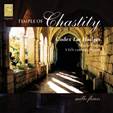 Though
this is advertised as Volume 1, it doesn�t appear that Mille
Fleurs made a follow-up recording. Anonymous 4 recorded a selection
from the Codex las Huelgas, Secret Voices (Harmonia Mundi
HMU807510) � it�s unfortunate that there are a few overlapping
items between their recording and this, but it offers a chance
for direct comparison. Both collections open with virgines
egregie, which Anonymous 4 take at a noticeably slower pace
and a cappella whereas Mille Fleurs give it the full
works � all three voices with instrumental accompaniment. You�d
hardly recognise the same piece � presented in contemplative
manner by one group and almost as a jolly piece of folk music
by the other. Of course, we don�t know how the music originally
sounded, and I enjoyed hearing both, but I suspect that the
Cistercian begetters of the manuscript would have preferred
the more contemplative version from Anonymous 4.
Though
this is advertised as Volume 1, it doesn�t appear that Mille
Fleurs made a follow-up recording. Anonymous 4 recorded a selection
from the Codex las Huelgas, Secret Voices (Harmonia Mundi
HMU807510) � it�s unfortunate that there are a few overlapping
items between their recording and this, but it offers a chance
for direct comparison. Both collections open with virgines
egregie, which Anonymous 4 take at a noticeably slower pace
and a cappella whereas Mille Fleurs give it the full
works � all three voices with instrumental accompaniment. You�d
hardly recognise the same piece � presented in contemplative
manner by one group and almost as a jolly piece of folk music
by the other. Of course, we don�t know how the music originally
sounded, and I enjoyed hearing both, but I suspect that the
Cistercian begetters of the manuscript would have preferred
the more contemplative version from Anonymous 4.
The two recordings differ as to the title of castrum
or claustrum pudicie, castle or enclosure of chastity
� either makes sense � and the boot is on the other foot here,
with Anonymous 4, again a cappella, dispatching the piece
more expeditiously than Mille Fleurs. You may well have a preference
for the music with or without accompaniment � I�m all for the
penny plain in that respect, as an admirer of the Gothic Voices
practice in such works � but in other respects honours are about
even between the two recordings. Accompaniment apart, Anonymous
4 mostly sound smoother than Mille Fleurs. Despite the overlap
of a few works, too, there�s enough that�s unique to one or
the other collection to merit my recommending both. Were it
still available, I�d also recommend the Sequentia recording
on Deutsche Harmonia Mundi to which Gary Higginson refers; in
many respects that remains my preference among the three.
I was about to join Gary Higginson in lamenting the lack of
text for confessorum agonia until I noticed that, despite
what the credits say, it�s performed in a purely instrumental
version. The Signum recording is good. I listened to the Harmonia
Mundi for comparison via Spotify � it sounds well and, I imagine,
better still in the 320kb/s download from hmvdigital.com. At
$10.73, the eclassical.com version not only comes in lossless
sound at the same price as mp3, it�s also competitive in price
with downloads from other sites.
Masters of the Rolls: Music by English composers of the fourteenth
century
Ab ora summa nuncius [3:10]
Inter usitata/Inter tot et tales/TENOR [1:46]
Vexilla regni prodeunt [3:52]
Singularis laudis digna [5:14]
Dulcia dona redemptoris [2:04]
Summum regem honoremus [1:45]
Omnis terra/Habenti dabitur/TENOR [2:51]
Copiose caritatis [1:12]
Missus Gabriel de celis [1:59]
Pura, placens/Parfundement plure/TENOR [2:20]
Letetur celi curia [3:21]
Salve regina [2:44]
Jesu fili virginis [0:47]
Jesu fili/Jesu lumen/[Jesu Fili Virginis] [2:05]
Sospitati dat egrotos [1:35]
Exultemus et letemur [2:00]
Stella maris illustrans omnia [2:14]
Venit dilectus meus [4:57]
Pange lingua [4:09]
O sponsa Dei electa [1:34]
Generosa Jesse plantula [2:38]
Musicorum collegio/In templo Dei/TENOR [2:46]
Gothic Voices (Catherine King, Steven Harrold, Julian Podger,
Leigh Nixon, Charles Daniels, Stephen Charlesworth)/Christopher
Page � rec. 1999. DDD
Pdf booklet with texts and translations included.
HYPERION HELIOS CDH55364 [59:04] � from hyperion-records.co.uk
(mp3 and lossless)
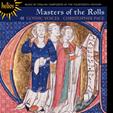 This
latest (and almost last)* budget reissue from the many distinguished
recordings which Gothic Voices made for Hyperion is due for
release on CD in July, 2012, but is available for download now.
This
latest (and almost last)* budget reissue from the many distinguished
recordings which Gothic Voices made for Hyperion is due for
release on CD in July, 2012, but is available for download now.
All the composers are anonymous, though graced in their time
by the title magister, master, hence the rather fanciful
Masters of the Rolls, referring not to the government
official known by that title (custos rotulorum) but to
the rolls of music which we see illustrated on the cover shot.
One of the singers in particular is looking decidedly apprehensive
in that picture � thinking, perhaps, how hard the music is to
sing � but the outcome doesn�t suggest that Gothic Voices or
their director were at all fazed by the music on this recording.
The recording is first class. Christopher Page�s notes are,
as usual, excellent; perhaps he�s a little less technical than
is sometimes the case, referring to one of the types of singing
in the fourteenth century as �having all the voices sing the
same text at the same moment�.
* Jerusalem Vision of Peace remains at full price (CDA67039:
see Hyperion
Top 30) but frequently features as a special offer (CD offered
at £4.00 as I write). Guillaume
de MACHAUT The Mirror of Narcissus also remains
at full price but the download costs just £5.99 (CDA66087,
see below).
The perennial favourite Hildegard recording, A Feather
on the Breath of God has been reduced to mid price (CDA30009:
see Hyperion
Top 30 � download for £4.99 at the time of writing);
the rest have all appeared on Helios at budget price:
o A Song for Francesca: GAW21286 or CDH55291
� see review
(Robert Hugill) and September 2011/1 Roundup
o Pierre de la RUE Masses
CDH55296 � see review
(Gary Higginson) and April 2011/2 Roundup
o Lancaster and Valois CDH55294 � see below
o Music for the Lion-hearted King CDH55292 � see
my review
of the CD: Bargain of the Month
o The Castle of Fair Welcome CDH55274 � see my
review
of the CD: Bargain of the Month
o The Earliest Songbook in England CDH55297 �
January 2012/1 Roundup
o The Garden of Zephirus CDH55289 � see my review
of the CD: Bargain of the Month
o The Marriage of Heaven and Hell CDH55273 � see
my review
of the CD
o The Medieval Romantics CDH55293 � see below
o The Service of Venus and Mars CDH55290 � see
review
o The Spirits of England and France 1 CDH55281
� see my review
of the CD.
o The Spirits of England and France 2 CDH55282
� see my review
of the CD.
o The Spirits of England and France 3 CDH55283
� see review
(J-P Joyce) and my review
� Bargain of the Month
o The Spirits of England and France 4 CDH55284
� see October 2010 Roundup
o The Spirits of England and France 5 CDH55285
� February 2011 Roundup
and review
� Bargain of the Month
o The Study of Love CDH55295 � see my review
of the CD
o The Voice in the Garden CDH55298 � see review
(Robert Hugill) and my review
of the CD
I�m surprised to see that we haven�t reviewed Lancaster
and Valois: French and English Music c.1350-1420
(CDH55294 � full details and mp3 or lossless download
from hyperion.co.uk)
and The Medieval Romantics: French Songs and
Motets, 1340-1440 (CDH55293 � full details and mp3
or lossless download from hyperion.co.uk),
the first two parts of the triptych which concludes with The
Study of Love, but it�s easy to repair the omission: these
are just as essential purchases for anyone with an interest
in medieval music as any of the others listed above, including
those which have been selected for a special encomium.
Both contain music by the great Guillaume
de MACHAUT (c.1300-1377), a collection of whose music
under the title The Mirror of Narcissus we also seem
to have missed, more excusably since it was released in 1987,
well before MusicWeb International came into being:
Dame, de qui toute ma joie vient [5:31]
Foy porter [3:20]
Dame, je sui cilz / Fins cuers doulz / Fins cuers doulz
[3:01]
Tuit mi penser [3:11]
Dame, mon cuer en vous remaint [4:30]
Dame, a qui [5:37]
Biauté qui toutes autres pere [4:51]
Je vivroie liement [2:24]
Rose, liz, printemps, verdure [4:37]
Dame, a vous sans retollir [2:56]
Amours me fait desirer [4:13]
Douce dame jolie [2:52]
Inviolata genitrix / Felix virgo / Contratenor / Ad
te suspiramus [3:47]
Gothic Voices/Christopher Page � rec.1983. DDD
Pdf booklet with texts and translations included.
HYPERION CDA66087 [50:56] � from hyperion-records.co.uk
(mp3 and lossless)
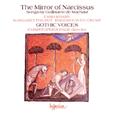 It�s
invidious to pick one artistic figure from the fourteenth century
but if I had to plump, it would be for Machaut, poet and musician.
His influence on Chaucer alone would be enough to guarantee
him a place in my musical pantheon and I suspect that�s part
of the attraction for Christopher Page, an English don as well
as a musician. The performances here are every bit as fine as
the others in the series and there are two added attractions:
though still at full price on CD, the download comes at £5.99
and the Gothic Voices are joined here by Emma Kirkby.
It�s
invidious to pick one artistic figure from the fourteenth century
but if I had to plump, it would be for Machaut, poet and musician.
His influence on Chaucer alone would be enough to guarantee
him a place in my musical pantheon and I suspect that�s part
of the attraction for Christopher Page, an English don as well
as a musician. The performances here are every bit as fine as
the others in the series and there are two added attractions:
though still at full price on CD, the download comes at £5.99
and the Gothic Voices are joined here by Emma Kirkby.
[For a less enthusiastic view of this and other Gothic Voices
recordings, see Gary Higginson�s review
of the music of Pierre de la Rue. The New Albion recording to
which he refers, NA068CD, can be streamed from the Naxos
Music Library or downloaded in mp3 from classicsonline.com.]
Guillaume de MACHAUT Le remède
de Fortune
Qui n�aroit autre deport [16:19]
Tels rit au main qui au soir [44:11]
Joie, plaisence et douce norriture [5:42]
En amer a douce vie [4:25]
Dame, de qui toute ma joie vient [5:51]
Dame, a vous sans retollir [2:40]
Dame, mon cuer en vous remaint [5:01]
Dame, mon cuer en vous remaint [4:36]
Marc Mauillon (vocal), Angelique Mauillon (harp), Vivabiancaluna
Biffi (vocal, viol) and Pierre Hamon (recorders) � rec. c.2008?
DDD.
ELOQUENTIA EL0918 [2 CDs: 88:44] � from
emusic.com (mp3)
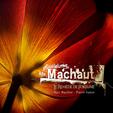 Similar
repertoire to the Gothic Voices album, but there are major differences
in interpretation and one potentially hard nut to crack in the
complainte which gives the recording its title, the 44-minute
long monophonic Tels rit au main (He who laughs in the
morning weeps at night.) The only other recording which I can
trace of this work (Ars Nova Ensemble, on the New Albion label)
offers an abridged 10-minute version. Whatever may be your opinion
concerning the use of instrumental backing � and I�m with Gothic
Voices� unaccompanied approach in general � it�s only the employment
of instruments that makes this work palatable for modern listeners;
for this modern listener, at least.
Similar
repertoire to the Gothic Voices album, but there are major differences
in interpretation and one potentially hard nut to crack in the
complainte which gives the recording its title, the 44-minute
long monophonic Tels rit au main (He who laughs in the
morning weeps at night.) The only other recording which I can
trace of this work (Ars Nova Ensemble, on the New Albion label)
offers an abridged 10-minute version. Whatever may be your opinion
concerning the use of instrumental backing � and I�m with Gothic
Voices� unaccompanied approach in general � it�s only the employment
of instruments that makes this work palatable for modern listeners;
for this modern listener, at least.
The recording, as usual with emusic.com, comes at variable,
mostly low, bit-rates � Winamp hovers between 152 and 224 �
but sounds acceptable. The lack of texts and translations is
a severe handicap, though you�ll find some of them freely available
for the Hyperion album from the website. The price tag of £3.36
or less offers a considerable saving over the CDs (around £16-17).
Guillaume de MACHAUT
Messe de Nostre Dame [24:23]
Le Lai de la Fonteinne [23:20]
Rondeau: Ma fin est mon commencement [5:38]
The Hilliard Ensemble (David James, Ashley Stafford (counter-tenor);
Rogers Covey-Crump, John Potter, Mark Padmore, Leigh Nixon (tenor);
Paul Hillier, Michael George (bass))/Paul Hillier
� rec. March 1987 and February 1989
Pdf booklet with texts and translations included.
HYPERION CDA66358 [53:22] � from hyperion-records.co.uk
(mp3 and lossless)
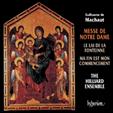 Among
the many fine recordings of this seminal work � so far as we
know, the first complete setting of the Mass � the Hilliards
have consistently been at or near the top of most reviewers�
lists and I�m not about to put a spanner in the works. At the
moment, indeed, there�s not a huge amount of competition. Other
recordings may be more �adventurous�, but this is the version
to which I return when looking for calm and tranquillity at
the end of the day � which is by no means to say that it�s bland.
Among
the many fine recordings of this seminal work � so far as we
know, the first complete setting of the Mass � the Hilliards
have consistently been at or near the top of most reviewers�
lists and I�m not about to put a spanner in the works. At the
moment, indeed, there�s not a huge amount of competition. Other
recordings may be more �adventurous�, but this is the version
to which I return when looking for calm and tranquillity at
the end of the day � which is by no means to say that it�s bland.
If you are looking for a liturgical reconstruction � or, at
least, one that places the sections of the Mass in context with
the propers � I recommend searching out the Harmonic Records
CD (H/CD8391) which Tony Haywood reviewed here
and which has been my other version of choice for some time.
It�s not generally available in the UK at the moment, but Diabolus
in Musica offer a good alternative, also with propers (ALPHA132
� download from classicsonline.com
for £4.99 or stream from Naxos Music Library). Andrew
Parrott�s version with the Taverner Choir and Consort offers
a similar solution, too � no longer available on CD, but download
for £4.49 from hmvdigital.com.
Because of the slightly short playing time, the Hyperion download
is on offer for just £5.99.
Thomas TALLIS (c.1505-1585)
The Complete Works: Volume 7 � Music for Queen Elizabeth
Salvator mundi I [2:19]
O sacrum convivium [3:15]
In manus tuas [1:51]
O nata lux de lumine [1:54]
Absterge Domine [5:31]
Discomfort them O Lord [4:37]
Domine, quis habitabit [8:29]
Laudate Dominum [4:04]
Miserere nostri [2:18]
Salvator mundi II [2:21]
Mihi autem nimis [2:15]
O salutaris hostia [2:38]
In ieiunio et fletu (Low) [3:59]
In ieiunio et fletu (High) [3:18]
Derelinquat impius [3:49]
Spem in alium [10:03]
Chapelle du Roi/Alistair Dixon
SIGNUM SIGCD029 [62:45] from eclassical.com
(mp3 and lossless) or stream from Naxos Music Library
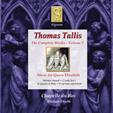 I�ve
already recommended the whole series of which Volume 7 forms
the most attractive part for the majority of listeners, but
I felt that I must try eclassical.com�s lossless (flac) version
and, having done so, I�m happy to commend it as having a subtle
but worthwhile edge on the mp3 versions which I�ve recommended
heretofore: you�ll find Volumes 1-6 reviewed in the November
2008 Roundup
and Volumes 7-9 in the December 2008 Roundup.
At $11.28 the eclassical.com download compares well with the
price of £7.99 for the mp3 version from classicsonline.com;
eclassical.com also allows you to download lossless and return
for the mp3 later. Neither offers the booklet, but the extensive
notes may be obtained direct from signumrecords.com.
I�ve
already recommended the whole series of which Volume 7 forms
the most attractive part for the majority of listeners, but
I felt that I must try eclassical.com�s lossless (flac) version
and, having done so, I�m happy to commend it as having a subtle
but worthwhile edge on the mp3 versions which I�ve recommended
heretofore: you�ll find Volumes 1-6 reviewed in the November
2008 Roundup
and Volumes 7-9 in the December 2008 Roundup.
At $11.28 the eclassical.com download compares well with the
price of £7.99 for the mp3 version from classicsonline.com;
eclassical.com also allows you to download lossless and return
for the mp3 later. Neither offers the booklet, but the extensive
notes may be obtained direct from signumrecords.com.
I need hardly add that this glorious music receives superb performances
from Chapelle du Roi and Alistair Dixon. There are other fine
recordings of Spem in alium in particular, but none to which
I return more often than that on this Signum recording. For
those who don�t want the whole set, the 2-CD set of highlights,
Portrait of Tallis, remains available at budget price
(Note new catalogue number: Regis RRC2090: Bargain of
the Month � see review).
William BYRD (c.1540-1623) The
Great Service in the Chapel Royal
Mattins [29:50]
Constitues eos (Six-voice motet from Gradualia seu
cantionum sacrarum, liber secundus, London, 1607: prima
pars) [1:11]
Venite [5:13]
Psalm 114: When Israel came out of Egypt [1:54]
Te Deum [9:35]
Benedictus [9:17]
Anthem: Sing joyfully unto God our strength [2:38]
Communion [11:34]
Nunc scio vere (Six-voice motet from Gradualia seu
cantionum sacrarum, liber secundus, London, 1607: prima
pars [3:50]
Kyrie [0:54]
Organ solo Prelude in C [1:14]
Creed [5:34]
Evensong [25:49]
Hodie Simon Petrus (Six-voice motet from Gradualia
seu cantionum sacrarum, liber secundus, London, 1607) [3:34]
Psalm 47. O clap your hands together, all ye people [3:11]
Magnificat [9:27]
Organ solo Verse in C [2:05]
Nunc dimittis [5:02]
Anthem: O Lord, make thy servant Elizabeth [2:27]
Steven Devine (organ); The English Cornett and Sackbut Ensemble
Musica Contexta/Simon Ravens � rec. 2011. DDD.
Pdf booklet available
CHANDOS CHAN0789 [67:24] � from theclassicalshop.net
(mp3, 16- and 24-bit lossless)
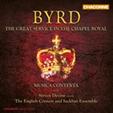 There
are a number of fine recordings of Byrd�s Great Service (see
below) but they offer just the two canticles for Mattins, the
two for Evensong, Kyrie and Creed. True to their name, Musica
Contexta here offer those settings in the context of how they
might have been performed in Queen Elizabeth�s Chapel Royal,
where the services were conducted with such vestments and ceremonial
that, as the notes put it, the link with Rome seemed to have
been bent rather than broken, with Latin settings employed as
well as English.
There
are a number of fine recordings of Byrd�s Great Service (see
below) but they offer just the two canticles for Mattins, the
two for Evensong, Kyrie and Creed. True to their name, Musica
Contexta here offer those settings in the context of how they
might have been performed in Queen Elizabeth�s Chapel Royal,
where the services were conducted with such vestments and ceremonial
that, as the notes put it, the link with Rome seemed to have
been bent rather than broken, with Latin settings employed as
well as English.
Certainly Elizabeth was no puritan and foreign ambassadors often
reported little difference between the ceremonies in her Chapel
Royal and those of Rome. As for the use of Latin texts there
and in collegiate chapels and cathedrals, the Book of Common
Prayer specifically permits this use of any language �understanded
of the people�. The result here cannot be an attempt to reconstruct
the service for a particular day � we don�t have enough surviving
Byrd settings of English psalms for that; those chosen here
for Mattins and Evensong would not have been used on the same
day. On the other hand, the three Latin texts refer to St Peter�s
Day: Nunc scio vere is the Introit for Mass on that day
and Consitues eos and Hodie Sanctus Petrus also
relate to Peter.
The singers use Elizabethan pronunciation. Though they have
followed scholarly advice, reconstructing the pronunciation
of any period of the past is a hazardous affair, since we don�t
know at what pace the Great Vowel Shift, which changed the sound
of English progressively from the mid-fifteenth century onwards,
progressed.
In any case, diction is the least recommendable aspect of this
recording, since the instrumental accompaniment, heavier in
some places than others, sometimes makes the words almost inaudible.
The notes again claim modern scholarship for the employment
of the Cornett and Sackbut ensemble but it�s possible to have
too much of a good thing and the result, though rich and glorious,
does seem overdone to me. The unaccompanied singing of the anthem
for Queen Elizabeth at the end is one of the tracks which show
what might have been without them � it sounds very fine and
the words are audible.
The recording is good � I listened to the 16-bit lossless �
but could have been better balanced to avoid the over-prominence
of the instruments which I�ve mentioned. Some sloppy editing
has resulted in abridgement of the end of the Te Deum
in the booklet � the words in italics have been omitted: O Lord,
let thy mercy lighten upon us: as our trust is in thee.
An interesting experiment, then, and one to which I shall return,
but not as often as to:
o The Tallis Scholars sing William Byrd � the three Masses and
the Great Service: Gimell 2-for-1 CDGIM208
� see The Tallis Scholars at 30 Roundup
o The Great Service and other works: Westminster Abbey Choir/James
O�Donnell � Hyperion CDA67533
� see review*
and February 2010 Roundup
(mentioned in review of CDA67779).
For the Latin settings I continue to prefer The Cardinal�s Musick
and Andrew Carwood: all three pieces from the 1607 Gradualia
are included on Hyperion CDA67653
one of my Recordings of the Year for 2009.
* the King�s College recording referred to is no longer generally
available on CD or as a download.
Thoinot ARBEAU (Jehan
TABOUROT) (1519-1595)
Monsieur Arbeau�s School of Dancing (1589): Volume 1
Music from Orchésographie (1588/9) and other contemporary
collections
Convivium Vocalium; Convivium Musicum/Sven Berger � rec. May
1989. DDD.
Pdf booklet included.
MUSICA REDIVIVA MRCD001 [66:10] � from classicsonline.com
(mp3) or stream from Naxos Music Library
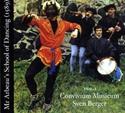 Only
recently I bemoaned the lack of a modern replacement for the
old Turnabout recording of this music; I didn�t look hard enough
because this was under my nose � I should have typed orchesographie
into the Naxos Music Library search engine. This Musica Rediviva
recording offers lively performances in an appropriate �jolly
japes� style, well recorded and complete with booklet. What
you see on the cover of that booklet is pretty much what you
get.
Only
recently I bemoaned the lack of a modern replacement for the
old Turnabout recording of this music; I didn�t look hard enough
because this was under my nose � I should have typed orchesographie
into the Naxos Music Library search engine. This Musica Rediviva
recording offers lively performances in an appropriate �jolly
japes� style, well recorded and complete with booklet. What
you see on the cover of that booklet is pretty much what you
get.
An added recommendation for this album is the price, just £4.99.
If you enjoyed this volume, try its successor on MRCD005.
The recording of renaissance music reviewed
by Kirk McElhearn, some of it from Orchésographie,
remains available from Antes
and as a download from amazon.co.uk.
Georg Philipp TELEMANN (1681-1767) The Autograph
Scores
Ouverture-Suite in F for two horns, bassoon, strings, and basso
continuo, TWV55:F16 [19:47]
Concerto in D for strings and basso continuo, TWV43:D4 [6:56]
Concert en Ouverture in A for solo violin, strings, and
basso continuo, TWV55:A7 [19:00]
Ouverture-Suite in D for two flutes, bassoon, strings, and basso
continuo, TWV55:D23 [22:09]
Fanfare in D for two flutes, bassoon, horn, strings, and basso
continuo, TWV50:44* [1:24]
Divertimento in E-flat for two flutes, two horns, strings, and
basso continuo, TWV50:21 [10:42]
Collegium Musicum 90/Simon Standage � rec. November 2011. DDD.
Pitch: A = 415 Hz Tuning: �Fifths tuned narrow until the thirds
sound good�
* premiere recording
Pdf booklet included
CHANDOS CHAN0787 [79:18] � from theclassicalshop.net
(mp3, 16- and 24-bit lossless) or stream from Naxos Music Library
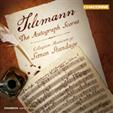 Collegium
90 present a programme of the surprisingly few works of Telemann
which have been preserved in manuscript form, in effect an appendix
to the other recordings of Telemann which they have made for
Chandos. I very much like Simon Standage�s way with Telemann,
making the music go with a real swing, and the new album is
no exception. Everything here is thoroughly delightful; Telemann
did, of course, write more serious music, but you won�t it among
this collection of suites and divertimentos. Forget the fact
that there are some doubts about whether everything is in Telemann�s
own hand and enjoy. The excellent performances are supported
by the first-rate recording � even if you only stream the �CD-quality�
version from Naxos Music Library you�ll be impressed; the amount
of continuo, (just) audible, is exactly right � and there�s
an excellent booklet of notes.
Collegium
90 present a programme of the surprisingly few works of Telemann
which have been preserved in manuscript form, in effect an appendix
to the other recordings of Telemann which they have made for
Chandos. I very much like Simon Standage�s way with Telemann,
making the music go with a real swing, and the new album is
no exception. Everything here is thoroughly delightful; Telemann
did, of course, write more serious music, but you won�t it among
this collection of suites and divertimentos. Forget the fact
that there are some doubts about whether everything is in Telemann�s
own hand and enjoy. The excellent performances are supported
by the first-rate recording � even if you only stream the �CD-quality�
version from Naxos Music Library you�ll be impressed; the amount
of continuo, (just) audible, is exactly right � and there�s
an excellent booklet of notes.
Jean-Philippe RAMEAU (1683-1764)
Dardanus (tragédie en musique, 1739) [36:33]
Le temple de la gloire (Opéra-ballet, 1745)
[29:56]
Tafelmusik Baroque Orchestra/Jeanne Lamon � rec. 2001. DDD
TAFELMUSIK TMK1012CD [67:12] � from classicsonline.com
(mp3) or stream from Naxos Music Library
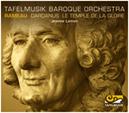 It�s
good to see the return to the catalogue of Tafelmusik who formerly
recorded for CBS and CBC � the present release comes from the
latter, first released in 2005 � now on their own label. These
two suites from Rameau�s operas have been recorded a number
of times, though only a few survive in the catalogue. A shorter
version of the Dardanus Suite (11 movements against Lamon�s
16), by the EU Baroque Orchestra conducted by Roy Goodman is
a notable bargain on Naxos 8.557490 � £4.99 from
classicsonline.com
� while Raymond Leppard�s ECO recording of the two Suites
from le Temple de la Gloire has been reissued with music
by Charpentier and Grétry on CD on Eloquence 480 2373
� see review.
The most stylish version of Rameau Overtures, including the
two from the operas, Les Talens Lyriques conducted by Christophe
Rousset, comes on mid-price Oiseau-Lyre 475 9107.
It�s
good to see the return to the catalogue of Tafelmusik who formerly
recorded for CBS and CBC � the present release comes from the
latter, first released in 2005 � now on their own label. These
two suites from Rameau�s operas have been recorded a number
of times, though only a few survive in the catalogue. A shorter
version of the Dardanus Suite (11 movements against Lamon�s
16), by the EU Baroque Orchestra conducted by Roy Goodman is
a notable bargain on Naxos 8.557490 � £4.99 from
classicsonline.com
� while Raymond Leppard�s ECO recording of the two Suites
from le Temple de la Gloire has been reissued with music
by Charpentier and Grétry on CD on Eloquence 480 2373
� see review.
The most stylish version of Rameau Overtures, including the
two from the operas, Les Talens Lyriques conducted by Christophe
Rousset, comes on mid-price Oiseau-Lyre 475 9107.
If you were tempted to explore Rameau�s music further by the
recent 2-CD Une fête baroque* with its three excerpts
from Dardanus, any one of these will provide an hour of wonderful
entertainment � even the least idiomatic from Leppard � but
none is more stylish, better performed or recorded than the
Tafelmusik reissue. This is currently their only recording from
the Naxos Music Library but classicsonline.com also have TMK1003CD,
The Galileo Project, with music by Bach, Handel, etc.
and more music by Rameau � that comes with the booklet, too.
More, please, from both sources.
If you wish to move on to a complete performance of Dardanus,
you�ll find Marc Minkowski�s DG Archiv recording for £11.99
from hmvdigital.com
� see 5-star review
of original release.
* An enjoyable recent 2-CD set celebrating the tenth anniversary
of Le Concert d�Astrée includes excerpts from one Lully
opera, Thésée, together with music from
four Rameau works, plus music by Purcell and Handel. Watch out
for my review on the main Musicweb International pages (Virgin
Classics 7307992, around £13 in the UK or download
for £8.99 as 5099973079958 from classicsonline.com).
London Calling: Music by Handel and his Contemporaries
George Frideric HANDEL (1685-1759)
Amadigi di Gaula, HWV11: Sinfonia (Act 1) [4:04]
Aria (Amadigi): T�amai, quant�il mio cor [5:16]
Aria (Amadigi): Vado, corro al mio tesoro [3:06]
Arcangelo CORELLI (1653-1713)
Concerto grosso in D, Op. 6/4 [9:57]
George Frideric HANDEL
Hercules, HWV60: Sinfonia (Act 3) [2:57]
Recitativo accompagnato (Dejanira): Where shall I fly? [5:58]
Francesco Maria VERACINI (1690-1768)
Sonata in A for violin and continuo (Sonate accademiche,
Op.2/9)* [11:30]
George Frideric HANDEL
Theodora, HWV68: Air (Irene): As with rosy steps [7:56]
Francesco GEMINIANI (1687-1762)
Concerto grosso in d minor, No.12 (�La Follia�) [11:19]
George Frideric HANDEL
Amadigi di Gaula, HWV11: Aria (Amadigi): O rendetemi
il mio bene [6:01]
Sinfonia (Act 3) [1:22]
Aria (Amadigi): Sento la gioia [5:02]
Bjarte Eike (violin); Thomas Pitt (cello); Fredrik Bock (theorbo);
Allan Rasmussen (harpsichord)*
Tuva Semmingsen (mezzo)
Barokksolistene/Bjarte Eike (artistic director and violin) �
rec. September 2010. DDD/DSD
pdf booklet with texts and translations included
BIS-SACD-1997 [76:15] � from eclassical.com
(mp3 and 16- and 24-bit lossless) or stream from Naxos Music
Library
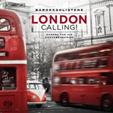 London
Calling - the old call sign of the BBC World Service � is
a convenient peg on which to hang music by Handel and some of
his contemporaries who found it an attractive city to ply their
wares around 1720. It�s not a new idea � see the Intim Music
album from 1997 below � but it�s useful because the selection
gives us the chance to check how similar their music could be
� Handel had, of course, absorbed the Italian style � though
in the case of Veracini it might have been more to the point
to have given us one of his concerti grossi or overtures. The
one significant composer who�s missing here is Bononcini, whose
music was thought to be so similar to Handel�s that they were
nicknamed �tweedledum and tweedledee�. (Strange that all
this difference should be / Twixt tweedledum and tweedledee.)
London
Calling - the old call sign of the BBC World Service � is
a convenient peg on which to hang music by Handel and some of
his contemporaries who found it an attractive city to ply their
wares around 1720. It�s not a new idea � see the Intim Music
album from 1997 below � but it�s useful because the selection
gives us the chance to check how similar their music could be
� Handel had, of course, absorbed the Italian style � though
in the case of Veracini it might have been more to the point
to have given us one of his concerti grossi or overtures. The
one significant composer who�s missing here is Bononcini, whose
music was thought to be so similar to Handel�s that they were
nicknamed �tweedledum and tweedledee�. (Strange that all
this difference should be / Twixt tweedledum and tweedledee.)
No matter; the Veracini sonata is very attractive � don�t be
put off by the �academic� label � and receives a heavenly performance.
We can check out his concerti grossi and overtures from recordings
on CPO (777 302-2), Naxos (8.553412 and 8.553413)
and DG Archiv (447 6442, coupled with music by Heinichen,
etc.). All but the last are available from classicsonline.com
and the DG can be downloaded from deutschegrammophon.com
in mp3 or lossless.
In the case of Bononcini there�s a recording entitled Handel
& Companye on which the music of Handel is combined
with that of Bononcini, Geminiani and Steffani (Intim Music
IMCD054: Musicke Companye [69:20] � from classicsonline.com,
£4.99 with pdf booklet, or stream from Naxos Music Library).
Neither the singing nor the instrumental playing are quite of
the standard of the new BIS recording, but they are good enough
to be enjoyable.
Performances and recording on the new BIS recording are very
good; I�m especially pleased with the balance that allows just
enough of the continuo to be heard without the harpsichord clattering
away too prominently. With booklet included and availability
in lossless as well as mp3 � come back later for fodder for
your mp3 player � this is worth a strong recommendation. The
price of $11.42 ($18.27 for the 24-bit) is very competitive,
too. I imagine that the red Routemaster buses on the cover will
help sell this album in London Olympics year, though they have
nothing to do with Handel. With or without them, this is certain
to be a regular visitor to my music system.
Johann Sebastian BACH (1685-1750)
Organ Transcriptions
Introduction and Fugue from the Cantata Ich hatte viel Bekümmernis
(transcr. Liszt) [5:32]
Chorale Wir setzen uns mit Tränen nieder from St
Mark Passion, BWV 244 (transcr. Robert Schaab) [6:02]
Concerto in d minor, BWV 596, after Antonio Vivaldi (transcr.
JS Bach) [10:48]
Symphonia pastorale from Christmas Oratorio, BWV
248 (transcr. Karg-Elert) [6:50]
Miserere mei from Bach�s Memento (transcr. Widor)
[4:22]
Prelude and Fugue in b flat minor, BWV 867, from The Well-Tempered
Clavier I (transcr. Max Reger) [7:05]
Wachet auf ruft uns die Stimme, BWV 645 (transcr. JS
Bach) [4:21]
Sinfonia from Cantata Wir danken dir, Gott, BWV 29 (transcr.
Marcel Dupré) [4:05]
Trio Sonata in C, after BWV 1031 (transcr. Martin Schmeding)
[11:00]
Chaconne in d minor from Partita II, BWV 1004 (transcr. Arno
Landmann) [14:30]
Martin Schmeding (organ) � rec. 20-22 September 2011. DDD/DSD.
Pdf booklet included
ARS PRODUKTION ARS38109 [75:19] � from classicsonline.com
(mp3) or stream from Naxos Music Library
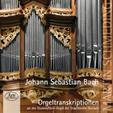 Inspired
by Dominy Clements� Recording of the Month review
of the CD � a superb recording which he had hardly been able
to put down for weeks � I checked this out in CD quality from
the Naxos Music Library. He�s absolutely right: this recording
of transcriptions by Bach of his own and others� music and of
Bach�s music by later composers, including the organist, Martin
Schmeding himself, is infectious.
Inspired
by Dominy Clements� Recording of the Month review
of the CD � a superb recording which he had hardly been able
to put down for weeks � I checked this out in CD quality from
the Naxos Music Library. He�s absolutely right: this recording
of transcriptions by Bach of his own and others� music and of
Bach�s music by later composers, including the organist, Martin
Schmeding himself, is infectious.
The quality of the Naxos Music Library version suggests that
the classicsonline.com download will be fine, but you may wish
to wait for a lossless version to appear from eclassical.com
� you may even find that their version costs slightly less or
little more than the mp3 at £7.99 from classicsonline.com
Johann Sebastian BACH (1685-1750)
Cantatas 163-182
Concentus Musicus Wien/Nikolaus Harnoncourt (Nos. 163, 167,
168, 169, 171, 173, 174, 177-179 and 182)
Leonhardt Consort/Gustav Leonhardt (Nos. 164-166, 170, 172,
175, 176, 180 and 181)
WARNER TELDEC DAS ALTE WERK [6 CDs: 6:02:32] � from amazon.co.uk
(mp3)
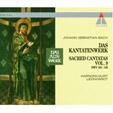 I�ve
chosen the single-disc recording of Cantatas 10-12 from this
series as Bargain of the Month, but this and the other 6-CD
sets are even better value, at £13.49, for those prepared
to take a bigger plunge. In this case, though Amazon advertise
only Cantatas 163-166, you actually get Nos. 163 to 182, which
means casting your net very widely across the church�s year:
Nos. 163, 164, 168-170 and 177-180 are for Sundays after Trinity,
Normal Time as it�s now called, 165 and 176 for Trinity Sunday,
166 for Easter 4, 167 for St John�s Day, 171 for New Year, 172-175
for Whitsuntide, 181 for Sexagesima and 182 for Palm Sunday.
I�ve
chosen the single-disc recording of Cantatas 10-12 from this
series as Bargain of the Month, but this and the other 6-CD
sets are even better value, at £13.49, for those prepared
to take a bigger plunge. In this case, though Amazon advertise
only Cantatas 163-166, you actually get Nos. 163 to 182, which
means casting your net very widely across the church�s year:
Nos. 163, 164, 168-170 and 177-180 are for Sundays after Trinity,
Normal Time as it�s now called, 165 and 176 for Trinity Sunday,
166 for Easter 4, 167 for St John�s Day, 171 for New Year, 172-175
for Whitsuntide, 181 for Sexagesima and 182 for Palm Sunday.
Nikolaus Harnoncourt has the lion�s share here by a small margin;
both his and Leonhardt�s contributions remind us how much modern
performance practice owes to this joint series. I�m not at all
surprised to see one reviewer, writing about the recently released
153-CD complete Bach from Warner Classics placing the cantatas
at the heart of Bach�s output and returning to these pioneering
recordings even in preference to Gardiner (SDG) and Suzuki (BIS).
That goes for me, too, even though I�d throw Richter (DG Archiv),
Rilling (Hänssler) and Kuijken (Accent) into the list of
excellent recordings � such an embarrassment of riches, not
to mention individual recordings from the likes of Andrew Parrott,
Monica Huggett (both on Virgin), Philippe Herreweghe (Virgin
and Harmonia Mundi), Florilegium (Channel Classics) and Christopher
Hogwood (Decca/Oiseau Lyre). Look to these alternatives if boy
trebles, as used on the Teldec set, put you off.
It really is time that amazon.co.uk joined other providers in
offering mp3 at 320kb/s, but their normal 256kb/s here is perfectly
adequate. There are no texts, but these and translations can
readily be found online. This is too much of a good thing to
be taken in one helping; if you have set Amazon to sync to iTunes,
you�ll find the individual Harnoncourt and Leonhardt contributions
sorted into separate sections, but even each of those is too
much for one listening session.
Ignaz (Ignace) Joseph PLEYEL
(1757-1831) Symphony in C (B151) [23:40]
Johann Baptist VANHAL (Jan Křitel
VAŇHAL) (1739-1813) Symphony in C (C17) [15:00]
Ignaz Josef PLEYEL Sinfonia
Concertante in F (B113) [20:11]
Philharmonie Györ/Paul Weigold � rec. c.2003. DDD
ARS PRODUKTION 38811 [58:51] � from eclassical.com
(mp3 and lossless) or stream from Naxos Music Library
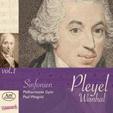 This
is the first volume of several live recordings of Pleyel�s music
on the Ars Produktion label � all available from eclassical.com
or the Naxos Music Library. Although individual works are available
on other recordings*, this is the most thorough coverage currently
available. In addition to Pleyel, works by his contemporaries
are included, as is the case with the Vanhal here.
This
is the first volume of several live recordings of Pleyel�s music
on the Ars Produktion label � all available from eclassical.com
or the Naxos Music Library. Although individual works are available
on other recordings*, this is the most thorough coverage currently
available. In addition to Pleyel, works by his contemporaries
are included, as is the case with the Vanhal here.
The music is attractive � often reminiscent of Haydn and Mozart,
though not equal to either at his best � and the performances
do it justice. The recording is good; the live audience produce
one or two audible coughs and creaks, but there is no applause,
which I know some listeners don�t like to hear. Mp3 and lossless
(flac) come at the same price � you can download one and return
for the other, but there are no notes. As an additional attraction:
at $10.59 this album is attractively priced when others offer
mp3 downloads only for £7.99.
* there�s an entire disc of Pleyel symphonies in the Chandos
Contemporaries of Mozart series, available separately
(CHAN9525)
or on a 12-CD USB plug and play collection (CHUSB0001
� see May 2011/2 Roundup).
Frédéric (Fryderyk) CHOPIN
(1810-1849)
Scherzi Nos. 1-4 [8:18 + 9:12 + 6:40 + 9:58]
Nocturne No.5 in f-sharp major, Op. 15 No. 2 [3:11]
Nocturne No.19 in e minor, Op. 72 No. 1 [4:02]
Nocturne No.20 in c sharp minor, Op. post. [3:46]
Ferenc (Franz) LISZT (1811-1886)
Polish Songs S480/5 Meine Freuden (Moja pieszczotka,
My Joys) (after Chopin) [3:22]
Polish Songs S480/1 �Maiden�s Wish� (after Chopin) [3:39]
En rêve � Nocturne S207 [2:18]
Maurice RAVEL (1875-1937)
Gaspard de la Nuit [20:44]
Benjamin Grosvenor (piano) � rec. 2011. DDD.
DECCA/LINN UNI013 [75:24] � from linnrecords.com
(mp3, 16- and 24-bit lossless)
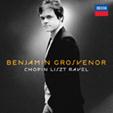 This
recording was released to great acclaim in 2011. We seem to
have missed it on its appearance, so I�m happy to make good
the omission. Decca even considered the Maiden�s Wish
special enough to issue it on a limited-edition 10" vinyl
single for Record Store Day 2012.
This
recording was released to great acclaim in 2011. We seem to
have missed it on its appearance, so I�m happy to make good
the omission. Decca even considered the Maiden�s Wish
special enough to issue it on a limited-edition 10" vinyl
single for Record Store Day 2012.
The programme appears tailor-made to display not only Benjamin
Grosvenor�s technique but also his sensitivity to the music,
especially in the major work here, the Ravel Gaspard.
That comes last, as is appropriate, after the Chopin and Chopin-inspired
Liszt. I have to admit that solo Chopin is not my area of expertise
� I�m much more taken with the piano concertos � but I can admire
excellent playing when I hear it, and that�s what we get here.
More than that, it held my attention in the way that Chopin�s
solo music often doesn�t.
It�s the Ravel that received the lion�s share of the praise
on CD and it�s for this that I shall mainly be listening regularly
to this recording and hoping that we shall have more � much
more � from this young man in due course.
The download comes in a variety of formats, from mp3 (£8)
via 16-bit flac and wma (£10) to Studio Master 24/96 flac
and wma (£18) � the last well worth the investment for
audiophiles. If you think that good recording doesn�t matter
in the case of the solo piano � it�s actually one of the most
difficult instruments to record, as anyone who ever tried to
do so with an old reel-to-reel recorder will attest � the 24-bit
version of this album should make you think again, so truthfully
is the instrument captured. The CD scored the maximum 5 stars
from most reviewers, so I guess the Studio Master deserves 5
stars plus.
Giuseppe VERDI (1813-901)
Falstaff � Opera in three acts
(Libretto: Arrigo Boito)
Sir John Falstaff � Fernando Corena (baritone)
Fenton � Juan Oncina (Acts I & II)/Kevin Miller (Act III)
Ford -Walter Monachesi (baritone)
Dr Caius � Dermot Troy (tenor)
Bardolfo � Daniel McCosham (tenor)
Pistola � Marco Stefanoni (bass)
Alice Ford � Anna Maria Rovere (soprano)
Nannetta � Eugenia Ratti (soprano)
Meg Page � Fernanda Cadoni (mezzo)
Mistress Quickly � Oralia Dominguez (contralto)
Glyndebourne Opera Chorus
Royal Philharmonic Orchestra/Carlo Maria Giulini � rec. Edinburgh
Festival, Edinburgh, 25 August 1955. ADD/mono.
Pdf booklet included � no texts.
ICA CLASSICS ICAC5061 [58:15 + 67:04] � from classicsonline.com
(mp3)
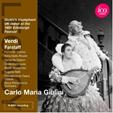 This
recording, licensed from the BBC, preserves what the cover of
the booklet aptly describes as Giulini�s triumphant UK debut.
Its principal competitors among vintage versions are the Gui
recording from 1960, again with Glyndebourne forces, with Geraint
Evans in the title role, recently reissued on GFOCD02160
and Karajan�s 1956 studio recording on EMI Opera, with Tito
Gobbi in the title role � see September 2011/2 Roundup.
Be aware that classicsonline.com�s yo-yoing price policy means
that at the time of writing their version of the Karajan costs
not £8.99 as I wrote then, but £13.99; hmvdigital.com
offer better value at £8.99, like the classicsonline.com,
their download comes in full 320kb/s mp3.
This
recording, licensed from the BBC, preserves what the cover of
the booklet aptly describes as Giulini�s triumphant UK debut.
Its principal competitors among vintage versions are the Gui
recording from 1960, again with Glyndebourne forces, with Geraint
Evans in the title role, recently reissued on GFOCD02160
and Karajan�s 1956 studio recording on EMI Opera, with Tito
Gobbi in the title role � see September 2011/2 Roundup.
Be aware that classicsonline.com�s yo-yoing price policy means
that at the time of writing their version of the Karajan costs
not £8.99 as I wrote then, but £13.99; hmvdigital.com
offer better value at £8.99, like the classicsonline.com,
their download comes in full 320kb/s mp3.
Geraint Evans and Tito Gobbi were among the greatest ever Shakespearean
or Verdi Falstaffs; Fernando Corena doesn�t quite throw himself
into the role to the same extent, but he�s not far behind. With
Giulini�s sure hand in Verdi � his Requiem still heads
my short-list for that work � and strong supporting cast, this
is a very enjoyable recording.
The rather dry recording requires a degree of tolerance at first
but the ear soon adjusts. Nevertheless, such is the quality
of the Karajan recording that the superior studio sound, together
with its availability at an advantageous price if you choose
the hmvdigital.com version at £8.99, sways the decision
for me, as I think it will for most.
It�s a shame that, though the pdf booklet is part of the deal,
no libretto is included; I�d gladly have sacrificed the seven
pages of glossy illustrations of other ICA albums to have had
at least a synopsis. No matter, you�ll find synopsis and libretto
online easily enough.
Max BRUCH (1828-1920)
Violin Concerto No.1 in g minor, Op.26 [24:20]
Scottish Fantasia [28:08]
Kyung-Wha Chung (violin); Royal Philharmonic Orchestra/Rudolf
Kempe
DECCA/LINN UNI003 [52:29] � from linnrecords.com
(mp3, 16- and 24-bit lossless)
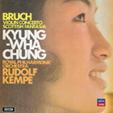 This
recording has been around a while � I used to own the LP and
the recent Virtuoso reissue is available as a 320kb/s download
from hmvdigital.com for as little as £5.53 � but I�ve
never heard it sounding so well. Nor do I consider that the
remake which Kyung-Wha Chung made for EMI with Klaus Tennstedt*,
coupled with the Beethoven, has superseded it, if only because
I love the �MacBruch� Scottish Fantasia perhaps even
more than the first Violin Concerto. It certainly deserves to
be better known; both works consist mainly of music to wallow
in, but a good wallow never did any harm. All concerned here
do it in the best possible taste, yet I still want to hum along
� an unsophisticated reaction which I�m rarely tempted to indulge.
£18 for the flac or wma 24-bit/16kHz versions may seem
a lot but audiophiles will consider it money well spent; others
will be content with the 16-bit at £10 or even the mp3
(at full 320kb/s) at £8.
This
recording has been around a while � I used to own the LP and
the recent Virtuoso reissue is available as a 320kb/s download
from hmvdigital.com for as little as £5.53 � but I�ve
never heard it sounding so well. Nor do I consider that the
remake which Kyung-Wha Chung made for EMI with Klaus Tennstedt*,
coupled with the Beethoven, has superseded it, if only because
I love the �MacBruch� Scottish Fantasia perhaps even
more than the first Violin Concerto. It certainly deserves to
be better known; both works consist mainly of music to wallow
in, but a good wallow never did any harm. All concerned here
do it in the best possible taste, yet I still want to hum along
� an unsophisticated reaction which I�m rarely tempted to indulge.
£18 for the flac or wma 24-bit/16kHz versions may seem
a lot but audiophiles will consider it money well spent; others
will be content with the 16-bit at £10 or even the mp3
(at full 320kb/s) at £8.
I enjoyed the Beulah reissue of Campoli�s version of the Scottish
Fantasia (7-9BX10 - see April 2011/1 Roundup),
but Chung�s is the version to go for, especially in so fine
a transfer. The passionato.com link to the Oistrakh version
listed in the Campoli review no longer applies.
* if you want that, hmvdigital.com have it for £7.99.
Camille SAINT-SAËNS (1835-1921)
Danse bacchanale from Act III of Samson et Dalila,
Op. 47 (1877) [6:44]
Le Rouet d�Omphale, Poème symphonique, Op. 31
(1872) [7:51]
Phaëton, Poème symphonique, Op. 39 (1873)
[8:21]
Danse macabre, Poème symphonique, Op. 40 (1874)
[6:36]
La Jeunesse d�Hercule, Poème symphonique, Op.
50 (1877) [13:58]
Marche militaire française - No. 4 from Suite
algérienne, Op. 60 (1880) [4:10]
Overture to La Princesse jaune, Op. 30 (1872) [5:54]
Une nuit à Lisbonne, Op. 63 (1880) [3:37]
Spartacus (1863) [12:56]
Marche du couronnement, Op. 117 (c. 1902) [6:21]
Royal Scottish National Orchestra/Neeme Järvi
rec. 14-15 September 2011, Royal Concert Hall, Glasgow, UK
Pdf booklet included
CHANDOS CHSA5104 [77:40] � from theclassicalshop.net
(mp3, 16-bit lossless, Studio 24/96 stereo & surround)
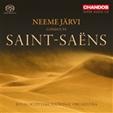 The
partnership between Neeme Järvi and the Scottish National
Orchestra � as it was then � was a fruitful one, yielding some
fine Strauss and Shostakovich along the way. It�s good to see
the conductor at the helm of his old band again, although their
recent Wagner series didn�t impress me. Perhaps that�s because
it isn�t the kind of repertoire one associates with Järvi;
come to think of it, Saint-Saëns isn�t either, although
a quick dip into this collection suggests otherwise. As always,
I�ve selected the 24/96 flacs for review.
The
partnership between Neeme Järvi and the Scottish National
Orchestra � as it was then � was a fruitful one, yielding some
fine Strauss and Shostakovich along the way. It�s good to see
the conductor at the helm of his old band again, although their
recent Wagner series didn�t impress me. Perhaps that�s because
it isn�t the kind of repertoire one associates with Järvi;
come to think of it, Saint-Saëns isn�t either, although
a quick dip into this collection suggests otherwise. As always,
I�ve selected the 24/96 flacs for review.
Looking at the track list these are the familiar �lollipops�
one might expect on an LP from Albert Wolff, Arthur Fiedler
or Ernest Ansermet. And where better to start than with the
show-stopping Danse bacchanale. From that first plucked
note it�s clear we�re in for something special; apart from that
big, beefy Chandos sound the RSNO are in spectacular form, driven
to deliver by a maestro intent on playing these pieces for all
they�re worth. There�s an electric charge surging through this
programme, revitalising music much dulled by repetition. And
goodness, what a wild party this is, the percussion especially
well caught. Now that�s what I call an orgy.
The symphonic poems are no less enjoyable, Le Rouet d�Omphale,
Phaëton and La Jeunesse d�Hercule played with
a clarity and strength I�ve not heard in a long while. The RSNO,
now diaphanous now bold, seem to be enjoying themselves immensely,
the freewheeling Phaëton played with remarkable
grace and refinement. Järvi�s not the most subtle of conductors
at times, but these gems are most beautifully done. That said,
the big tutti in Phaëton will make you jump,
the weird sonorities and rhythms of the Danse macabre as entertaining
as ever. Violinist Maya Iwabuchi�s spooky solos are superb,
Järvi making the music sound more sinuous than usual.
True, not all of the works here are from the top drawer, but
that hardly matters when they�re so well played. And in the
heady aftermath of M. Hollande�s election the Gallic hauteur
of the Marche militaire seems especially apt. The brass
and side drums are splendid and rhythms are taut, the piece
building to a climax of Tchaikovskian weight and colour. The
stately Marche du couronnement is no less satisfying: broad,
spacious and chockful of lovely detail. This really is a top-notch
recording, bringing back fond memories of Chandos�s halcyon
days with this orchestra and conductor.
Spartacus continues the composer�s Greco-Roman theme
with music of animation and sweep. But the voltage does fluctuate
somewhat, and the piece almost outstays its welcome. That said,
it�s played with as much commitment and care as anything here.
As for the overture to Saint-Saëns� oriental pot-boiler,
The Yellow Princess, it has a mild Polovtsian flavour
that Järvi brings out rather well; otherwise it�s one of
the composer�s more unremarkable efforts. No such caveats about
A Night in Lisbon, which gets a warm and sensuous outing.
Wolff and Ansermet are uniquely inspired in this repertoire,
but Järvi can be just as thrilling, even if his musical
sensibilities are closer to Russia than to France. Throw in
vintage Chandos sound and really, what�s not to like?
Dan Morgan
http://twitter.com/mahlerei
Antonín DVOŘÁK (1841-1904)
String Quintet No. 2 in G, Op.77 (B49) [34:17]
Nocturne in B for strings, Op.40 (B47) [6:04]
String Quintet No. 3 in E flat, Op. 97 (B180) �American�: Scherzo
[5:25]
Berlin Philharmonic String Quintet
PENTATONE PTC5186458 [45:43] � from classicsonline.com
(mp3)
String Quintet No. 2 in G, Op. 77 (B49) [33:10]
Nocturne (Intermezzo) in B for strings, Op.40 (B47) [4:14]
String Quintet No. 3 in E flat, Op. 97 (B180) �American� [31:10]
Chilingirian Quartet with Duncan McTier (double-bass) and Simon
Rowland-Jones (viola) � rec. 1990 and 1991. DDD
Pdf booklet available.
CHANDOS CHAN9046 [68:11] � from theclassicalshop.net
(mp3 and lossless)
Piano Quartet No. 2 in E flat, Op.87 (B162) (1889) [34:32]
Piano Quintet No.2 in A, Op.81 (B155) (1887)* [39:43]
Songs my mother taught me, Op.55/4 (B104) (1883) [2:03]
Schubert Ensemble (Simon Blendis (violin); Douglas Paterson
(viola); Jane Salmon (cello)
William Howard (piano)) with Alexandra Wood (violin)* � rec.
November 2011. DDD.
Pdf booklet included.
CHANDOS CHAN10719 [76:55] � from theclassicalshop.net
(mp3 and lossless) or stream from Naxos Music Library
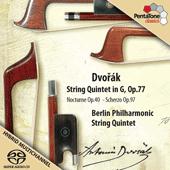
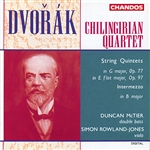 The
second String Quintet is glorious music, but it�s not nearly
well enough known when it�s not far behind the �American� Quartet
and the Piano Quintet in quality and appeal. The record-buying
public are at least partly to blame, with excellent CDs from
Hyperion and Chandos available only to special order or as downloads.
The
second String Quintet is glorious music, but it�s not nearly
well enough known when it�s not far behind the �American� Quartet
and the Piano Quintet in quality and appeal. The record-buying
public are at least partly to blame, with excellent CDs from
Hyperion and Chandos available only to special order or as downloads.
The first-rate new PentaTone performances in good mp3
sound should help but, however good the performances, 46 minutes
for a full-price recording seems extremely stingy � �never mind
the quality, feel the width� in reverse. Why could we not have
been given the whole of Op.97 instead of just the scherzo? CHAN9046
gives us all three works and with room to spare. The reduced
price of the download as against the SACD helps soften the blow
to pocket or purse, though you lose the booklet of notes and
there�s no lossless option, which comes with Chandos*, let alone
surround sound. Both performances are excellent, so it�s safe
to leave your choice to preference of coupling and how far you
are put off from paying even £7.99 (£6.39 as a special
offer as I write) for a download of a short recording. If you
wait a little longer, it�s likely that eclassical.com will issue
the PentaTone version, not only in lossless at the same price
as mp3 but also at a price that takes account of the short playing
time.
That Chandos recording is out of stock in CD form, so the download
is especially welcome. That it�s available in lossless sound
for just a little more than the mp3 is an added recommendation.
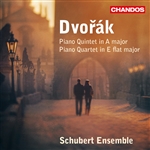 If
you haven�t yet added the better-known Piano Quintet to your
collection, the new Chandos (CHAN10719) is one of the
best ways to do so. As with the String Quintet, there are other
couplings to choose � Andreas Haefliger with the Takacs Quartet
has hitherto been my chief recommendation (Decca 466 1972,
with String Quartet No.10 � see September 2009 Roundup).
The passionato.com link for the Haefliger no longer applies:
go to deutschegrammophon.com
for mp3 or lossless.
If
you haven�t yet added the better-known Piano Quintet to your
collection, the new Chandos (CHAN10719) is one of the
best ways to do so. As with the String Quintet, there are other
couplings to choose � Andreas Haefliger with the Takacs Quartet
has hitherto been my chief recommendation (Decca 466 1972,
with String Quartet No.10 � see September 2009 Roundup).
The passionato.com link for the Haefliger no longer applies:
go to deutschegrammophon.com
for mp3 or lossless.
The Goldner Quartet and Piers Lane on Hyperion couple the two
Piano Quintets on CDA67805 � see review.)
If you prefer the mature Piano Quintet and String Quintet together,
go for the Gaudier Ensemble on another Hyperion recording (CDA66796).
Clifford Curzon�s classic performance of the Piano Quintet seems
no longer to be available in any form.
* mp3 and lossless flac are available from prestoclassical.co.uk.
Frederick DELIUS (1862-1934) Anniversary
Inevitably there have already been several new releases and
reissues to celebrate Delius�s 150th anniversary and more are
appearing all the time.
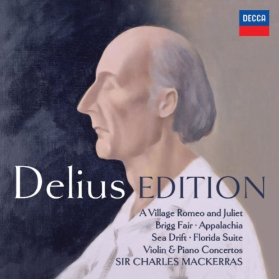 Decca
have released an 8-CD set of recordings directed by Sir Charles
Mackerras (478 3078), available for £19.99 from
hmvdigital.com.
That�s a small saving over the cost of the CDs � target price
around £26 in the UK � but it represents better value,
and in 320kb/s sound, than amazon.co.uk�s £35.99 for 256kb/s
when Amazon themselves offer the same set on CD for £25.77.
The earlier 2-CD Decca/Mackerras collection, now incorporated
in that larger set, was my joint Download of the Month
in the April 2011/1 Roundup.
The passionato.com link no longer applies: get it from hmvdigital.com
if you don�t want the 8-CD set.
Decca
have released an 8-CD set of recordings directed by Sir Charles
Mackerras (478 3078), available for £19.99 from
hmvdigital.com.
That�s a small saving over the cost of the CDs � target price
around £26 in the UK � but it represents better value,
and in 320kb/s sound, than amazon.co.uk�s £35.99 for 256kb/s
when Amazon themselves offer the same set on CD for £25.77.
The earlier 2-CD Decca/Mackerras collection, now incorporated
in that larger set, was my joint Download of the Month
in the April 2011/1 Roundup.
The passionato.com link no longer applies: get it from hmvdigital.com
if you don�t want the 8-CD set.
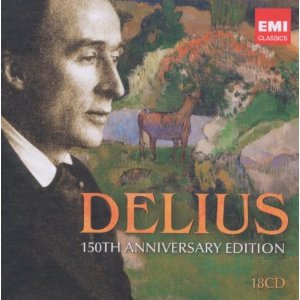 EMI�s
more recent, more comprehensive, 18-CD box (0841752 -
see review
) seems not to be available yet as a download, but the CD set
sells for around £30 in the UK. If you�re buying the CDs
of either or both sets, shop around � prices seem to vary very
widely.
EMI�s
more recent, more comprehensive, 18-CD box (0841752 -
see review
) seems not to be available yet as a download, but the CD set
sells for around £30 in the UK. If you�re buying the CDs
of either or both sets, shop around � prices seem to vary very
widely.
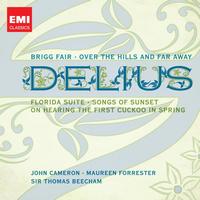 I
haven�t yet laid eyes on the new EMI set but, of course, most
of the components are well enough known for it to be self-recommending;
Rob Barnett thought it irresistible � see review.
Equally self-recommending is the 2-CD budget set of Delius�s
music in EMI�s 20th Century Classics series (0946532:
download from hmvdigital.com),
all directed by Sir Thomas Beecham and effectively replacing
the single-CD Great Recordings reissue which I recommended in
the May 2010 Roundup.
Even if you have the single CD or download, you should consider
this inexpensive release � unless, of course, you have the yet
more tempting EMI set The English Tradition, containing
even more Beecham Delius � see review
and July 2011/1 Roundup:
Bargain of the Month.
I
haven�t yet laid eyes on the new EMI set but, of course, most
of the components are well enough known for it to be self-recommending;
Rob Barnett thought it irresistible � see review.
Equally self-recommending is the 2-CD budget set of Delius�s
music in EMI�s 20th Century Classics series (0946532:
download from hmvdigital.com),
all directed by Sir Thomas Beecham and effectively replacing
the single-CD Great Recordings reissue which I recommended in
the May 2010 Roundup.
Even if you have the single CD or download, you should consider
this inexpensive release � unless, of course, you have the yet
more tempting EMI set The English Tradition, containing
even more Beecham Delius � see review
and July 2011/1 Roundup:
Bargain of the Month.
There�s another inexpensive EMI 2-CD set, this time involving
various artists:
Essential Delius: 150th Anniversary Edition
CD 1
On hearing the first cuckoo in Spring [5:49]
Summer night on the river [6:31]
London Philharmonic Orchestra/Vernon Handley � rec. 1979
The Walk to the Paradise Garden arr. Beecham [9:45]
London Symphony Orchestra/Sir John Barbirolli � rec. 1967
A Song before Sunrise [6:09]
Royal Philharmonic Orchestra/Sir Malcolm Sargent � rec. 1965
Recorded and reissued on CD under the auspices of the Delius
Trust
La Calinda (arr. Fenby) [4:32]
Hallé Orchestra/Sir John Barbirolli � rec. 1969
Sleigh Ride [5:28]
Royal Philharmonic Orchestra/Sir Thomas Beecham
Fennimore and Gerda � Intermezzo (arr. Fenby) [4:45]
London Philharmonic Orchestra/Vernon Handley � rec. 1979
Irmelin � Prelude [5:43]
London Symphony Orchestra/Sir John Barbirolli � rec. 1967
Summer Evening [6:32]
Northern Sinfonia of England/Richard Hickox � rec. 1986
Paris: The Song of a Great City [21:40]
Royal Liverpool Philharmonic Orchestra/Sir Charles Mackerras
� rec. 1991
CD 2
In a Summer Garden [14:18]
Hallé Orchestra/Vernon Handley � rec. 1982
Hassan � Intermezzo (arr. Beecham) [2:24]
Hallé Orchestra/Sir John Barbirolli � rec. 1969
A Song of Summer [11:15]
London Symphony Orchestra/Sir John Barbirolli � rec. 1967
To Be Sung of a Summer Night on the Water [2:07]
Robert Tear (tenor); Choir of King�s College, Cambridge/Sir
Philip Ledger � rec. 1976
Late Swallows (arr. Fenby) [10:48]
London Symphony Orchestra/Sir John Barbirolli � rec. 1969
Dance Rhapsody No.2 [7:40]
Royal Philharmonic Orchestra/Sir Thomas Beecham
Recorded under the auspices of the Delius Trust
Cynara [9:32]
John Shirley-Quirk (baritone); Royal Liverpool Philharmonic
Orchestra/Sir Charles Groves � rec. 1975
Brigg Fair: An English Rhapsody [16:02]
Bournemouth Symphony Orchestra/Richard Hickox � rec. 1991
EMI ESSENTIAL 0842102 [77:26 + 76:26] � from hmvdigital.com
(mp3) or stream from Naxos Music Library
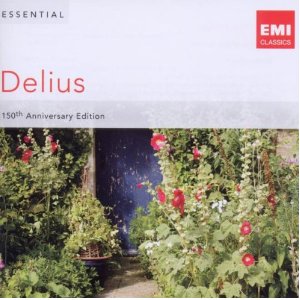 These
are all tried and tested performances, many of which I have,
or used to have, in my collection on LP or CD and I checked
out the whole set with great enjoyment from Naxos Music Library.
Though there are some Beecham items, it serves as a reminder
that EMI had other splendid Delius interpreters, too. Taken
as a whole this is a superb bargain � you�d pay more for the
two rather short Classics for Pleasure albums of Vernon Handley�s
Delius, many of the items from which feature here.
These
are all tried and tested performances, many of which I have,
or used to have, in my collection on LP or CD and I checked
out the whole set with great enjoyment from Naxos Music Library.
Though there are some Beecham items, it serves as a reminder
that EMI had other splendid Delius interpreters, too. Taken
as a whole this is a superb bargain � you�d pay more for the
two rather short Classics for Pleasure albums of Vernon Handley�s
Delius, many of the items from which feature here.
Despite assurances that their irrational pricing policy for
EMI recordings was due to be sorted out, classicsonline.com
were still asking £15.98 at the time of writing for a
CD set which can be had for as little as £6.75 on disc
and as a download from hmvdigital.com for £4.49. amazon.co.uk
have the download for the same price, but the hmvdigital.com
download comes at the full 320kb/s.
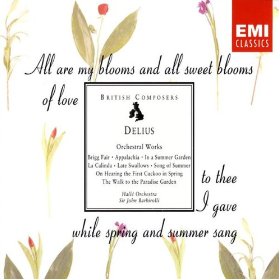 Hmvdigital.com
also offer the 2-CD set of Barbirolli�s Delius � Brigg
Fair, Appalachia, The first Cuckoo, etc., on EMI. The recordings
were, of course, made with the Hallé, not the LSO as
hmvdigital.com erroneously state. Good value at £8.99,
though it duplicates some of the performances from the Essential
Delius set.
Hmvdigital.com
also offer the 2-CD set of Barbirolli�s Delius � Brigg
Fair, Appalachia, The first Cuckoo, etc., on EMI. The recordings
were, of course, made with the Hallé, not the LSO as
hmvdigital.com erroneously state. Good value at £8.99,
though it duplicates some of the performances from the Essential
Delius set.
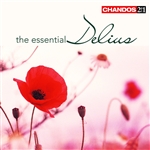 At
these prices, you should have enough left over for a similar,
only slightly less inexpensive, 2-CD collection from Chandos:
The Essential Delius, performances conducted by Vernon Handley
and Richard Hickox (CHAN241-37:
£8.40 in mp3, £10.00 in lossless sound � see January
2009 Roundup.)
The highlights are complete recordings of North Country Sketches
and the Florida Suite, neither of which features
on the EMI set, apart from La Calinda from the latter.
With these two substantial items, but no Brigg Fair,
the Chandos is effectively complementary to the EMI. The pdf
booklet is available to view, but cannot be saved. There�s not
a single dud recording in either of these collections.
At
these prices, you should have enough left over for a similar,
only slightly less inexpensive, 2-CD collection from Chandos:
The Essential Delius, performances conducted by Vernon Handley
and Richard Hickox (CHAN241-37:
£8.40 in mp3, £10.00 in lossless sound � see January
2009 Roundup.)
The highlights are complete recordings of North Country Sketches
and the Florida Suite, neither of which features
on the EMI set, apart from La Calinda from the latter.
With these two substantial items, but no Brigg Fair,
the Chandos is effectively complementary to the EMI. The pdf
booklet is available to view, but cannot be saved. There�s not
a single dud recording in either of these collections.
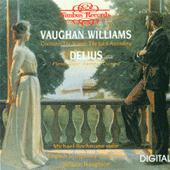 For
another very fine recording of the Florida Suite, with
Summer Evening and Vaughan Williams� Overture The
Wasps and The Lark Ascending, don�t overlook William
Boughton and the English Symphony Orchestra, recorded in 1989,
on Nimbus NI5208 � see my review
of the CD; purchase for £12 post-free worldwide from MusicWeb
International here,
stream from Naxos Music Library or download from classicsonline.com
(mp3). The Hickox recording to which I referred in that review
is no longer available from passionato.com, who are not now
in the download business, but can be downloaded from hmvdigital.com,
though their price of £8.49 is a little steep � and amazon.co.uk�s
£9.49 even steeper.
For
another very fine recording of the Florida Suite, with
Summer Evening and Vaughan Williams� Overture The
Wasps and The Lark Ascending, don�t overlook William
Boughton and the English Symphony Orchestra, recorded in 1989,
on Nimbus NI5208 � see my review
of the CD; purchase for £12 post-free worldwide from MusicWeb
International here,
stream from Naxos Music Library or download from classicsonline.com
(mp3). The Hickox recording to which I referred in that review
is no longer available from passionato.com, who are not now
in the download business, but can be downloaded from hmvdigital.com,
though their price of £8.49 is a little steep � and amazon.co.uk�s
£9.49 even steeper.
There are some recordings, especially of the historical variety,
which fall outside the remit of these box sets. Two of these,
recorded by Sir Thomas Beecham, can be obtained very inexpensively:
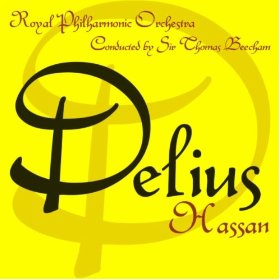 Hassan
� incidental music, recorded by Leslie Fry (baritone),
Arthur Leavins (violin), Frederick Riddle (viola), the BBC Chorus,
Royal Philharmonic Orchestra and Sir Thomas Beecham used to
be available on a mono Philips Classical favourites LP, in not
very good quality sound, coupled with North Country Sketches.
That coupling has been resurrected by Discover Classical
Music, and there is also a download on the Hallmark label where
what is billed as Hassan Part 2 turns out to be, in fact,
North Country Sketches, complete on one 25-minute track.
Hassan
� incidental music, recorded by Leslie Fry (baritone),
Arthur Leavins (violin), Frederick Riddle (viola), the BBC Chorus,
Royal Philharmonic Orchestra and Sir Thomas Beecham used to
be available on a mono Philips Classical favourites LP, in not
very good quality sound, coupled with North Country Sketches.
That coupling has been resurrected by Discover Classical
Music, and there is also a download on the Hallmark label where
what is billed as Hassan Part 2 turns out to be, in fact,
North Country Sketches, complete on one 25-minute track.
The sound is decent enough for its age, though there is a degree
of background noise, almost silent in places but with prominent
thumps in others. If you prefer the coupling with Beecham�s
version of Sea Drift, Emkay can oblige. You can try all
these transfers first from Spotify but it�s hardly going to
break the bank to obtain the emusic.com Hallmark download for
£0.84, or the Discover Classical or the Emkay from the
same source for £2.10 each. (£1.38, £4.45
and £3.45 respectively as downloads from amazon.co.uk
for non-emusic.com members.)
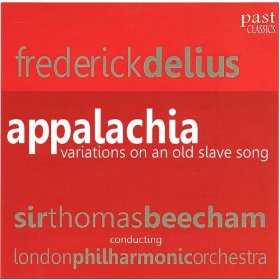 Emusic.com
also have Beecham�s Appalachia, also originally
Columbia, and also once available on the Philips GL label and
later on a deleted Sony CD*. The Past Classics transfer is extremely
good for its age, but inevitably dated � download from emusic.com
(£1.68) or hmvdigital.com (£3.16) or try it from
Spotify. Whereas no more modern recording of more than two short
items from Hassan, however, is readily available apart from
the 18-CD set, we do have a recent version of Appalachia,
coupled with Song of the High Hills, and in Hybrid SACD
and 24-bit surround sound, too: Sir Andrew Davis with the BBC
Symphony Chorus and Orchestra (Chandos CHSA5088 � see
review,
Recording of the Month; see April 2011/1 Roundup:
joint Download of the Month).
Emusic.com
also have Beecham�s Appalachia, also originally
Columbia, and also once available on the Philips GL label and
later on a deleted Sony CD*. The Past Classics transfer is extremely
good for its age, but inevitably dated � download from emusic.com
(£1.68) or hmvdigital.com (£3.16) or try it from
Spotify. Whereas no more modern recording of more than two short
items from Hassan, however, is readily available apart from
the 18-CD set, we do have a recent version of Appalachia,
coupled with Song of the High Hills, and in Hybrid SACD
and 24-bit surround sound, too: Sir Andrew Davis with the BBC
Symphony Chorus and Orchestra (Chandos CHSA5088 � see
review,
Recording of the Month; see April 2011/1 Roundup:
joint Download of the Month).
* It�s listed as the London Philharmonic Orchestra version (issued
on 78s), but the sound is surely too good to be other than the
later LP version with the Royal Philharmonic. Amazon.co.uk offer
a Hallmark download of Appalachia plus An Arabesque
for £2.07, which is listed as the RPO version,
yet what I�ve heard sounds more like a transfer from 78s! If
it�s the LPO version that you want, the Naxos transfer (with
Brigg Fair and Hassan: Closing Scene) offers a
much better transfer. From classicsonline.com
or try it on Spotify or the Naxos Music Library.
Richard STRAUSS (1864-1949)
Don Quixote, Op.35* [44:16]
Horn Concerto No.2 in E-flat, AV132** [19:52]
Pierre Fournier (cello), Giusto Cappone (viola)*
Norbert Hauptmann (horn)**
Berlin Philharmonic Orchestra/Herbert von Karajan � rec. 1965,
1973. ADD.
DG/LINN UNI017 [64:09] � from linnrecords.com
(mp3, 16- and 24-bit lossless)
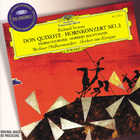 Most
of my reviews of Linn Studio Master reissues of recordings from
the Universal stable so far, like all the others that I�ve included
in this Roundup, have been from Decca, but this Deutsche Grammophon
release is fully their equal. Of Karajan�s several recordings
of Don Quixote, this has a fair claim to be his best
and one of the top recommendations of all time: an earlier reissue,
on the DG Galleria label, coupled with Tod und Verklärung,
has been my version of choice for some considerable time. Some
have found Karajan too detached in this music, but that�s not
a view that I share.
Most
of my reviews of Linn Studio Master reissues of recordings from
the Universal stable so far, like all the others that I�ve included
in this Roundup, have been from Decca, but this Deutsche Grammophon
release is fully their equal. Of Karajan�s several recordings
of Don Quixote, this has a fair claim to be his best
and one of the top recommendations of all time: an earlier reissue,
on the DG Galleria label, coupled with Tod und Verklärung,
has been my version of choice for some considerable time. Some
have found Karajan too detached in this music, but that�s not
a view that I share.
The Horn Concerto No.2 makes a strange bedfellow � one that
would have been better placed preceding Don Quixote -
but it, too, receives an exemplary performance, excelled only
among versions that I know by Dennis Brain with Wolfgang Sawallisch,
more aptly coupled with the first concerto and Hindemith�s Horn
Concerto and Konzertmusik (EMI Great Recordings mono/stereo
� download for £5.99 as 0724356778351 from classicsonline.com).
Though you can obtain an mp3 download of this DG Original recording
for as little as £4.99 from hmvdigital.com,
the superior Studio Master re-mastering of the analogue original
represents £18 well spent. (320kb/s mp3 at £8 and
CD-quality 16-bit at £10 are also available.)
Other recommendable recordings of Don Quixote of much
the same vintage include George Szell � no longer available
on CD or download but look out for possible reissues � and,
at budget price, Paul Tortelier and Rudolf Kempe with the Berlin
Phil, coupled with Till Eulenspiegel and Don Juan (Regis RRC1371
� see review
by Michael Cookson and April 2012/1 Roundup).
The Regis sounds well in mp3 from classicsonline.com or Naxos
Music Library, but it�s no match sonically for the Karajan which
has come up splendidly in the Studio Master version � subtly
but noticeably better than my Galleria CD.
Gerald FINZI (1901-1956)
Earth and Air and Rain: Five Song Cycles to Words by
Thomas Hardy
CD 1 [59:58]
Earth and Air and Rain Op.15** [30:32]
Till Earth outwears Op.19a* [16:27]
I said to Love Op.19b** [12:58]
CD 2 [60:00]
A Young Man�s Exhortation Op.14* [28:53]
Before and after Summer Op.16** [31:06]
Martyn Hill (tenor)*
Stephen Varcoe (baritone)**
Clifford Benson (piano) � rec. December 1984. DDD.
HYPERION DYAD CDD22070 [2 CDs for the price of one: 119:58]
� from hyperion-records.co.uk
(mp3 and lossless)
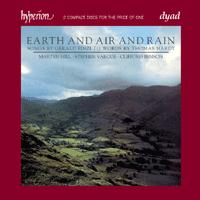 Reviewing
the new Resonus recording of Finzi�s music in May 2012/1 (RES10109),
I promised to consider this older complementary recording of
five of his song cycles in view of Rob Barnett�s somewhat �waspish�
(his word) review.
Reviewing
the new Resonus recording of Finzi�s music in May 2012/1 (RES10109),
I promised to consider this older complementary recording of
five of his song cycles in view of Rob Barnett�s somewhat �waspish�
(his word) review.
The 2-for-1 package undoubtedly offers excellent value at £7.99
for both mp3 and lossless sound, though hmvdigital.com
also offer the 2-CD Lyrita set which RB preferred for the same
price, but only at 192kb/s mp3. The real question concerns the
quality � fragile or otherwise? � of Stephen Varcoe�s voice.
In Earth and Air and Rain I thought him a little detached
at times in When I set out for Lyonesse, though he more
than atones in the very next song, Waiting Both.
In Sweet Lizbie Brown I hear some of the fragility on
which RB comments, certainly by comparison with John Carol Case�s
more forthright tone on Lyrita, but it seems so appropriate
to the theme of loss which permeates the poem:
I let you slip;
Shaped not a sign;
Touched never your lip
With lip of mine,
Lost Lizbie Browne!
By contrast, I thought Roderick Williams and Ian Burnside (Naxos
8.557963 � see review)
too upfront and cheerful in this song � no fragility here, but
not enough nostalgia, either. At 4:01, this is just a little
too fast � Varcoe and Benson (4:21) give it a little more time
to make its effect, as do John Carol Case and Howard Ferguson
on Lyrita (4:16). All three bring insights to the cycle and
I wouldn�t rate Varcoe below the other two.
Hardy�s poetry � Finzi�s favourite poet, though he does very
well by Traherne (Dies Natalis) and Wordsworth (Immortaloty
Ode), too � was the culmination of a career largely spent
writing the novels which produced enough money for the leisure
to be a poet. It�s often intense and personal; Finzi responds
to it intuitively, and so does the sensitive listener, which
is why I think RB has become so wedded to individual performances
such as John Carol Case in Earth and Air and Rain. Equally,
I have to say that I sometimes react adversely to Robert Tear,
RB�s preferred exponent of Till Earth Outwears; I very
much prefer Martyn Hill in this cycle.
Overall I�m far less inclined than RB to be waspish about this
Hyperion set � not really waspish at all. Either it or the Lyrita
would make an excellent next step for anyone who has taken my
advice and purchased the Resonus recording.
George GERSHWIN (1898-1937)
An American in Paris [21:44]
Ferde GROFÉ (1892-1972)
Grand Canyon Suite [33:32]
Charles Butler (trumpet)
Seattle Symphony/Gerard Schwarz rec. 1989 and 1990. DDD
Pdf booklet included
NAXOS 8.571205 [55:16] � from classicsonline.com
(mp3) or stream from Naxos Music Library
Aaron COPLAND (1900-1990)
Suite from Appalachian Spring [24:27]
Symphonic Ode [19:55]
Paul CRESTON (1906-1985)
Symphony No. 3, Op. 48 �Three Mysteries� (1950) [26:06]
I. The Nativity [9:32]
II. The Crucifixion [8:42]
III. The Resurrection [7:52]
David Ritt (trombone); Raymond Davis (cello); Susan Gulkis Assadi
(viola); Seth Krimsky (bassoon); Charles Butler (trumpet)
Seattle Symphony/Gerard Schwarz � rec. 1994 and 1992. DDD
Pdf booklet included.
NAXOS 8.571203 [70:28] � from classicsonline.com
(mp3) or stream from Naxos Music Library
Aaron COPLAND
Rodeo: Four Dance Episodes [19:25]
Piano Concerto [17:52]
Billy the Kid: Suite [20:52]
Lorin Hollander (piano)
Seattle Symphony/Gerard Schwarz � rec. 1990 and 1993. DDD.
Pdf booklet included
NAXOS 8.571202 [58:09] � from classicsonline.com
(mp3) or stream from Naxos Music Library
[reviewed in March 2012/2 Roundup]
More excellent reissues of ex-Delos Seattle/Schwarz recordings
to join those which I and others have welcomed in recent months.
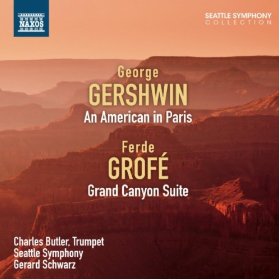 8.571205:
Schwarz brings out both the rumbustious and delicate elements
of An American � the latter to an extent that I hadn�t
appreciated before, without detriment to the music�s energy.
At much the same price there�s the Doráti recording on
Regis RRC1386 which I reviewed in the previous Roundup
� an all-Gershwin programme, which you may prefer for that reason,
though it seems a little hurried and less sensitive to the subtler
elements than Schwarz. The older Regis recording has come up
well but the Naxos is even better and the mp3 transfer does
justice to an excellent recording.
8.571205:
Schwarz brings out both the rumbustious and delicate elements
of An American � the latter to an extent that I hadn�t
appreciated before, without detriment to the music�s energy.
At much the same price there�s the Doráti recording on
Regis RRC1386 which I reviewed in the previous Roundup
� an all-Gershwin programme, which you may prefer for that reason,
though it seems a little hurried and less sensitive to the subtler
elements than Schwarz. The older Regis recording has come up
well but the Naxos is even better and the mp3 transfer does
justice to an excellent recording.
This restores the version of An American which I was
hoping for when I reviewed the Copland works on 8.571202
in the March 2012/2 Roundup � I�ve repeated the details
and given a link above for ease of reference.
I can�t pretend that Grofé�s Grand Canyon is great
music, but it�s very colourful and enjoyable and it receives
a first-class performance and recording. If you would like to
hear it in the context of Grofé�s two other picturesque
suites, Mississippi and Death Valley, you may
prefer the Slatkin recording on EMI American Classics � but
see my slightly lukewarm review of the parent CD. If you still
want the Slatkin, download the less expensive of classicsonline.com�s
two offerings of this here. Try it first from the Naxos Music
Library if possible.
At first I thought the Naxos notes a bit rudimentary until I
realised that the version offered by the Naxos Music Library
is missing page 2, as, I presume, is the classicsonline.com
download. No matter; it�s all there if you click �about this
recording�, though it doesn�t tell you anything about the programme
of the Grand Canyon Suite.
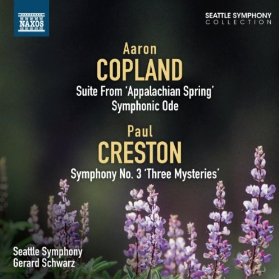 8.571203:
It�s a little disappointing that Schwarz recorded only the Suite
from Appalachian Spring. Those who would prefer the whole
thing should note the availability of the recording of the chamber-scale
original by the San Francisco SO and Michael Tilson Thomas on
SFS media 82193600342, coupled with Ives� Holidays
Symphony, the latter as reviewed by me on DVD � here
� download for £4.99, complete with pdf booklet, from
classicsonline.com.
There�s also an excellent earlier Tilson Thomas all-Copland
recording, again of the complete ballet, on a budget-price RCA
download � see Bargain of the Month review
of the CD and October 2009 Roundup
for that even less expensive recording.
8.571203:
It�s a little disappointing that Schwarz recorded only the Suite
from Appalachian Spring. Those who would prefer the whole
thing should note the availability of the recording of the chamber-scale
original by the San Francisco SO and Michael Tilson Thomas on
SFS media 82193600342, coupled with Ives� Holidays
Symphony, the latter as reviewed by me on DVD � here
� download for £4.99, complete with pdf booklet, from
classicsonline.com.
There�s also an excellent earlier Tilson Thomas all-Copland
recording, again of the complete ballet, on a budget-price RCA
download � see Bargain of the Month review
of the CD and October 2009 Roundup
for that even less expensive recording.
That said, Schwarz�s performance of the Suite is about as good
as it gets; as in American in Paris, he brings out the
tender elements of the music � an indefinable wistful purity
� better than any other version that I know.
Naxos have other recordings of Creston�s music, including this
symphony. Rob Barnett gave a four-star rating to their earlier
recording of Symphonies 1-3 (National SO of the Ukraine/Theodore
Kuchar 8.559034) and Lewis Foreman was also appreciative,
but David Wright had severe reservations � see joint review.
All in all, Schwarz offers a much safer recommendation.
Dmitri SHOSTAKOVICH (1906-1975)
Symphony No. 1 in f minor, Op. 10 (1924-1925) [32:03]
Symphony No. 2 in B flat, Op. 14 �To October� (1927) [20:02]
Symphony No. 3 in E flat, Op. 20 �The First of May� (1929) [27:51]
Netherlands Radio Choir
Netherlands Radio Philharmonic Orchestra/Mark Wigglesworth �
rec. October 2006 (No. 1), October 2010 (Nos. 2 & 3). DDD/DSD
Pdf booklet with sung texts included (Cyrillic and English)
BIS-SACD-1603 [81:13] � from eclassical.com
(mp3, 16- and 24-bit lossless) or stream from Naxos Music Library
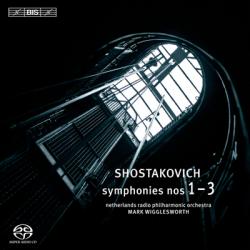 Dan
Morgan has already awarded Recording of the Month
status to the 24-bit version of this album � see his detailed
review.
I�d happily have followed suit had I been as readily sold on
Shostakovich before the Fourth Symphony � anything from then
on is real grist to my mill but the earlier symphonies a good
deal of sound and fury, too often signifying very little. I
see that when I reviewed the complete Ashkenazy set on Decca
� review
� I thought that he brought out qualities that raise the first
above a student work, barely mentioned the second and the third
not at all.
Dan
Morgan has already awarded Recording of the Month
status to the 24-bit version of this album � see his detailed
review.
I�d happily have followed suit had I been as readily sold on
Shostakovich before the Fourth Symphony � anything from then
on is real grist to my mill but the earlier symphonies a good
deal of sound and fury, too often signifying very little. I
see that when I reviewed the complete Ashkenazy set on Decca
� review
� I thought that he brought out qualities that raise the first
above a student work, barely mentioned the second and the third
not at all.
All concerned here make the strongest possible case, about on
a par with those Ashkenazy recordings � both almost convince
me about the first. I�m certainly encouraged to listen to other
recordings in this now nearly complete series � but I�m still
not really convinced about Nos. 2 and 3. Stream this first from
Naxos Music Library, if you can, and if you�re not sure about
it; you�ll even find the pdf booklet there.
As Dan has reviewed the 24-bit version, I tried the 16-bit lossless
version and thought it excellent, apart from the fact that the
level of the opening of the second symphony is virtually inaudible
at a normal listening level.
Jean FRANÇAIX (1912-1997)
Quintet No. 1, for flute, oboe, clarinet, bassoon and horn (1948)
[20:38]
Quintet No. 2, for flute, oboe/cor anglais, clarinet, bassoon
and horn (1987) [20:02]
Quartet, for flute, oboe, clarinet and bassoon (1933) [10:49]
Divertissement, for oboe, clarinet and bassoon (1947) [10:06]
Bergen Woodwind Quintet � Gro Sandvik (flute), Steinar Hannevold
(oboe), Fredrik Fors (clarinet), Ilene Chanon (horn), Per Hannevold
(bassoon)
rec. April 2008, Herdla Kirke, Askøy, Norway. DDD/DSD
BIS-SACD-2008 [62:48] � from eclassical.com
(mp3, 16- & 24-bit lossless) or stream from Naxos Music
Library
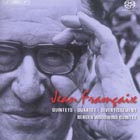 The
Bergen Woodwind Quintet is new to me, but the downloadable liner-notes
point to a busy ensemble immersed in teaching activities when
they�re not performing at home or abroad. As for Jean Françaix,
those unfamiliar with his œuvre will find these
wind pieces very approachable indeed, the composer�s ear for
pleasing sonorities and supple rhythms evident in every bar.
As always, I�ve chosen to review the 24-bit flacs which, at
the time of writing, were being offered for the same price as
the 16-bit files. Regular visitors to eclassical.com will know
that such �deals� are a regular feature of the site.
The
Bergen Woodwind Quintet is new to me, but the downloadable liner-notes
point to a busy ensemble immersed in teaching activities when
they�re not performing at home or abroad. As for Jean Françaix,
those unfamiliar with his œuvre will find these
wind pieces very approachable indeed, the composer�s ear for
pleasing sonorities and supple rhythms evident in every bar.
As always, I�ve chosen to review the 24-bit flacs which, at
the time of writing, were being offered for the same price as
the 16-bit files. Regular visitors to eclassical.com will know
that such �deals� are a regular feature of the site.
The first quintet�s technical challenges � which caused some
discontent when it was first played � pose no problems for the
BWQ, whose fast, fluid playing in the presto in particular
is impressive. Detail is sharp but not overly analytical, and
the recording has pleasing warmth and weight. And despite a
fairly close balance there�s plenty of �air� around the instruments.
As for the quality of the performance itself just listen to
the third movement � Tema con variazioni - played with
simple gravitas and a marvellous, singing line. There�s wit
and sparkle in the Puckish finale, and one has to marvel at
the pin-sharp articulation and sheer energy of this ensemble.
That may be a hard act to follow, but these players are even
more alluring in the second quintet, written almost four decades
later. After a gentle � rather wistful � Prelude the gurgling
Toccata is despatched with panache; what precise, pointful playing
this is, and yet how spontaneous it sounds. The Scherzo�s air
of joie de vivre is beautifully caught as well, the slow,
dark-toned Andante glowingly done. Even in such august
company bassoonist Per Hannevold deserves a special mention
here. They�re all so adroit in the dancing allegrissimo, flautist
Gro Sandvik especially so.
The early quartet may be leaner and tighter, but it�s no less
assured than the later works. As ever, the playing is crisp,
the pensive little andante deftly characterised. But it�s the
rollicking, Chaplinesque allegro molto that will get
the biggest smiles, the nimble allegro vivo scarcely
less enjoyable. This really is infectious music, and I can�t
imagine it better played than it is here.
The Divertissement is just that, a pleasant diversion
that�s as rhythmically dextrous as anything here. Think of it
as the crowning confection that rounds off a splendid meal.
Indeed, not quite sated I found myself returning for seconds.
A winning programme, superbly played and recorded.
Dan Morgan
http://twitter.com/mahlerei
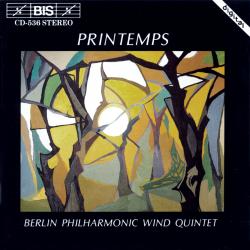 If
you�re just looking for the first Wind Quintet in the company
of some other mainly light-hearted French music for wind ensemble,
there�s an enjoyable earlier BIS recording entitled Printemps,
that you may wish to consider. Good performances by the Berlin
Phil Wind Quintet and well recorded:
If
you�re just looking for the first Wind Quintet in the company
of some other mainly light-hearted French music for wind ensemble,
there�s an enjoyable earlier BIS recording entitled Printemps,
that you may wish to consider. Good performances by the Berlin
Phil Wind Quintet and well recorded:
Jacques IBERT (1890-1962)
Trois Pièces brèves for wind quintet [6:48]
Henri TOMASI (1901-1971) Printemps
for wind quintet and saxophone [9:08]
Darius MILHAUD (1892-1947) La
Cheminée du roi René for wind quintet [12:54]
Charles KOECHLIN (1867-1951)
Septuor pour instruments à vent [15:24]
Jean FRANÇAIX (1912-1997)
Quintette no.1 for wind quintet [20:24]
Eugène BOZZA (1905-1991)
Scherzo pour quintette [2:35]
Berlin Philharmonic Wind Quintet � rec.1991. DDD.
Pdf booklet included
BIS-CD-536 [66:47] � from emusic.com
(mp3 and lossless) or stream from Naxos Music Library
The English Song Series: 22 � Britten
Benjamin BRITTEN (1913-1976)
Songs and Proverbs of William Blake, Op.74 [26:03]
Tit for Tat [8:38]
Folk-songs [25:50]
Roderick Williams (baritone)/Iain Burnside (piano) � rec. January
2011. DDD.
Pdf booklet with texts included
NAXOS 8.572600 [60:45] � from classicsonline.com
(mp3)
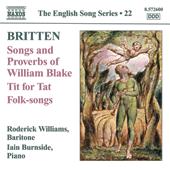 The
Blake texts which Britten set are among the glories of English
literature. Yet they are often either unfathomable � �The lust
of the goat is the bounty of God� � or unbearable � the little
chimney sweep whose parents condemned him to a life of misery
because he was happy. The latter quality is heightened
by the power of Britten�s setting and even more by Roderick
Williams�s performance, to the extent that this has to be a
recording to return to only when the nerves are not too raw.
The
Blake texts which Britten set are among the glories of English
literature. Yet they are often either unfathomable � �The lust
of the goat is the bounty of God� � or unbearable � the little
chimney sweep whose parents condemned him to a life of misery
because he was happy. The latter quality is heightened
by the power of Britten�s setting and even more by Roderick
Williams�s performance, to the extent that this has to be a
recording to return to only when the nerves are not too raw.
Though the settings were made for Dietrich Fischer-Dieskau (still
available on a 7-CD set, 475 6051 � download from hmvdigital.com),
it�s Peter Pears whom Williams evokes � sounding as much like
Pears as it�s possible for a baritone to do but without the
colourlessness of his voice. That�s even more the case in the
different milieu of the Folk Songs � I was introduced to them
long ago by Pears and Britten on a 10" LP: now on Decca
Eloquence 467 2362 or (selections) 480 1273 (2
CDs) or Heritage HTGCD224. (See Em Marshall�s review
of an earlier Decca incarnation). Pears may be sui generis
in this music but Williams comes very close indeed to matching
him and his voice is firmer than Pears�.
With excellent recording and perceptive notes, this deserves
a strong recommendation for all my reservations about playing
it only in the right mood.
John COLTRANE (1926-1967) A
Love Supreme
John Coltrane�s Quartet (John Coltrane (bandleader, vocals,
soprano and tenor saxophone); Jimmy Garrison (double bass);
Elvin Jones (drums); McCoy Tyner (piano) � rec. 1964. ADD.
DECCA/LINN UNI038 [32:46] � from linnrecords.com
(mp3, 16- and 24-bit lossless)
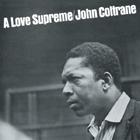 This
classic album has been round the block lots of times since it
was first released by Verve Records in 1965, and deservedly
so. For those in the know it marks an important transitional
phase in the development of John Coltrane�s music; for me it�s
simply one of the most enjoyable jazz recordings ever and I�m
delighted to see it revived in such excellent sound.
This
classic album has been round the block lots of times since it
was first released by Verve Records in 1965, and deservedly
so. For those in the know it marks an important transitional
phase in the development of John Coltrane�s music; for me it�s
simply one of the most enjoyable jazz recordings ever and I�m
delighted to see it revived in such excellent sound.
£16 may seem a high price for a 33-minute recording made
as long ago as 1964 but you couldn�t really add anything to
the programme, and audiophiles will find it well worth the money.
Linn�s other versions range from mp3 (£7.50) via 16-bit
wma (£8) to 16-bit flac (£10).
The Golden Age of Light Music: Holidays
for Strings
Music by David ROSE, BORODIN arr.
David CARROLL, Leroy ANDERSON, George
GERSHWIN, Percy FAITH, Robert FARNON, Frederick LOWE, Lorenz
HART, etc.
Orchestras conducted by Leroy Anderson, Frederick Fennell, Geoff
Love, Ron Goodwin, George Melachrino, Percy Faith, Steve Race,
Robert Farnon, etc. � rec. 1952-1961. ADD/mono/stereo.
Pdf booklet can be accessed and printed but not saved.
GUILD LIGHT MUSIC GLCD5189 [79:08] � from theclassicalshop.net
(mp3 and lossless)
[�This is yet another fine addition to the ever increasing number
of CDs in �The Golden Age of Light Music� series. Long may they
continue!� � see review
by John France for track details.]
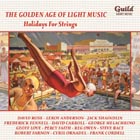 Suffice
to say that I enjoyed this every bit as much as John France,
both the pieces that I knew well and the less familiar. Most
of the recordings were made between 1959 and 1961. The first
half and the final track are in stereo, but even the mono tracks
sound well. As usual, the album comes with an eye-catching cover.
Suffice
to say that I enjoyed this every bit as much as John France,
both the pieces that I knew well and the less familiar. Most
of the recordings were made between 1959 and 1961. The first
half and the final track are in stereo, but even the mono tracks
sound well. As usual, the album comes with an eye-catching cover.
The mp3 download from theclassicalshop.net at £4.99 is
the least expensive, yet comes at the full 320kb/s, while their
lossless version at £7.99 costs little more than the mp3
from other providers, some of whom offer only 256kb/s or less.
For music of this vintage, mp3, at the full bit-rate, will be
good enough for most listeners � as I don�t have review access
to Guild downloads and had to pay for this, I chose the mp3.
Eric WHITACRE (b. 1970) Water
Night
Alleluia (2010) [9:25]
Equus (1999, rev. 2011)* [9:02]
Oculi omnium (2010) [3:17]
The River Cam** (2010) [11:54]
Her Sacred Spirit Soars (2002) [6:58]
Water Night (1995/6)* [6:06]
Goodnight Moon*** [5:09]
When David Heard [17:38]
Sleep My Child [6:28]
** Julian Lloyd Webber (cello); *** Hila Plitmann (soprano)
Eric Whitacre Singers; London Symphony Orchestra/Eric Whitacre
� rec.?
DECCA /LINN UNI024 [75:56] � from linnrecords.com
(mp3, 16- and 24-bit lossless)
[�I�m sure that Whitacre�s many admirers will want to acquire
this disc, especially as it contains so much material that is
previously unrecorded. Those who buy the disc will find that
the performances are all that could be desired in terms of quality
of singing and playing.� See review
by John Quinn.]
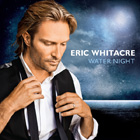 Most
of Linn�s releases from the Universal stable so far have been
from the distinguished back catalogue, but this is one of Decca�s
more recent recordings, reviewed by JQ just last month. Since
the masters were presumably in 24/96 or even 24/192 format,
it benefits even more than those with analogue antecedents from
Linn�s Studio Master treatment.
Most
of Linn�s releases from the Universal stable so far have been
from the distinguished back catalogue, but this is one of Decca�s
more recent recordings, reviewed by JQ just last month. Since
the masters were presumably in 24/96 or even 24/192 format,
it benefits even more than those with analogue antecedents from
Linn�s Studio Master treatment.
I very much enjoyed Eric Whitacre�s music on an earlier Hyperion
recording � interestingly, they made it one of their 30th anniversary
specials (CDA30028 � see October 2010 Roundup).
It would have been my Discovery of the Month if that accolade
had not gone to the music of Jonathan Dove on another Hyperion
release.
I know what John Quinn means about the preponderant sweetness
of the music but I found it less cloying than he did- and, whatever
either of us may think, I�m sure that the album has already
sold and will continue to do like the proverbial hot cakes.
The 24-bit sound is the crystal-clear icing on the cake. This
was the last music that I was listening to as I completed this
roundup and I found it a wonderful note on which to close.




 All Nimbus reviews
All Nimbus reviews








